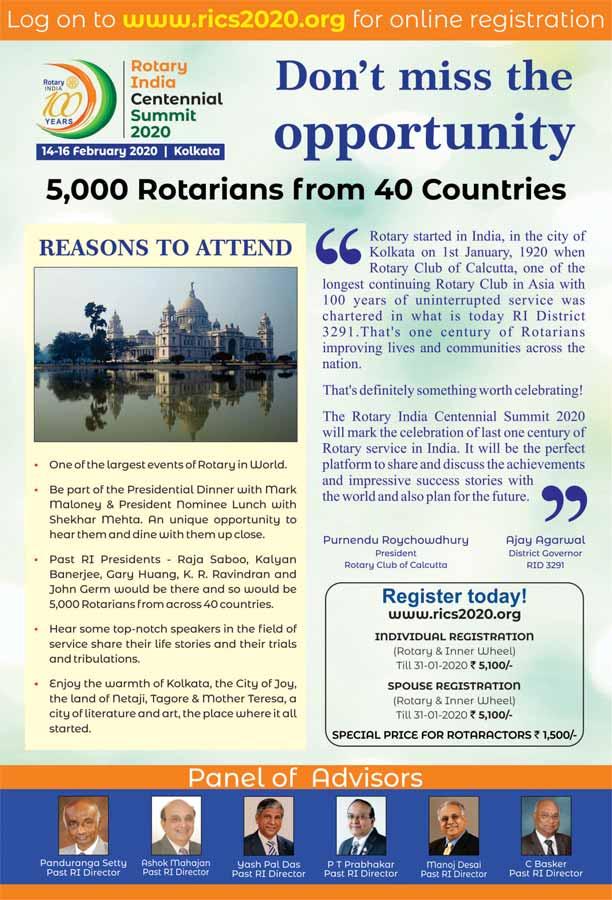
















Convener RID Bharat Pandya and Chairman T N Subramanian






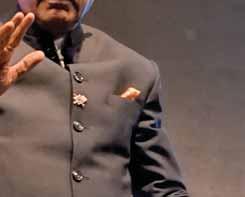





















Convener RID Bharat Pandya and Chairman T N Subramanian










12 Let us embrace both challenges & change
At the Indore Institute, RI President Mark Maloney dwells on the challenges Rotary has to overcome.
16 TRF seminar generates a frank discussion on global grants
Rotary leaders air their views at Indore on the global grants approval process.
30 Think from the heart, not the mind – RIPN Mehta
Rotary governorship is an opportunity for DGEs to serve humanity.
32 Dare to dream, soar, achieve: RI Director Pandya
With love, compassion and dreams, Rotarians can make a difference.
46 Women seek opportunities, not favours, to succeed: Smriti Irani
The Union Minister bats for women’s rights and gender parity.
63 An appeal to save Paul Harris’s home
The Rotary Founder’s home seeks Rotarians’ generosity to survive.
64 I’m a huge admirer of Rotary in South India: Shekhar Mehta






The RIPN compliments RI District 3211 for its great service projects.

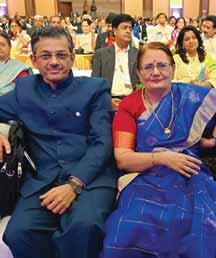
68 Binging on street food in Indore
A first-timer to Indore must visit Sarafa Bazaar for the city’s delicious street food.










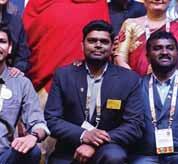


TheEditor’s Note Shattering ‘the beauty myth’ reaffirms that a black/brown skin can be stunningly beautiful. It’s true that a woman’s beauty is equated to a fair complexion in India. Rasheeda says what makes a woman’s persona is not just her appearance but her intelligence, wit, the sparkle in her eyes, the kindness in her heart and a hundred other qualities which make a woman so special. And Miss Universe 2019 is Zozibini Tunji, a black beauty.

26-year-old said. She is a strong proponent of natural beauty and one who “encourages women to love themselves as they are.” She wore her hair in a natural, short style.
K M K Murthy RC Secunderabad —
RID 3150
need to break out of this syndrome and work on their skills which are the only things that matter.
Ashok Kataria, RC Sri Ganganagar Marwar — RID 3090
TheAshok Jindal RC Nabha Greater — RID 3090
The Editorial on the beauty myth followed the crowning of a black girl as Miss Universe in December. Gifted and outspoken, Zozibini Tunzi spoke about shifting beauty standards and celebrating “black girl magic. I grew up in a world where a woman who looks like me — with my kind of skin and my kind of hair — was never considered beautiful,” the
Editor Rasheeda has reflected on a new dimension to beauty in her elegantly written Editorial, breaking the myth that only those with fair complexion are beautiful. That beauty depends on internal virtues has been poignantly narrated.
Dr G Xaviar Rajappa RC Rameswaram — RID 3212
This interpretation of beauty is enlightening. The reality is that in our society beauty is given undue importance, much more than skills and character. It is time to change this mentality. Women have achieved great success not because of their beauty but their brains. But some women worry a lot about their complexion. They
A relevant cover story
The cover story Suicide is a cry for help by Jaishree is impressive. It’s not just a warning sign that the person is thinking of suicide, but a cry for help. These days, women are beaten, there is child abuse, and so many other acts of violence.
S Natarajan RC Koothapakkam — RID 2981
Counsellors Dr Lakshmi and Dr Thara have given tangible solutions for preventing suicide. It is a pity that teenagers resort to suicide, in spite of the best efforts

Editor has taken me back to my college days, listing some of my favourite novelists. At 86, I am motivated to once again read them. I agree that re-reading classics gives us a new joy. We should follow the guidelines of RI Directors Bharat Pandya and Kamal Sanghvi on positive health. Jaishree has written about suicide, an important issue with youngsters who want instant satisfaction and have no patience to listen to advice from their elders.
S Muniandi RC Dindigul Fort — RID 3000
the Editor for choosing an important social issue for her Editorial. All Rotarians will endorse her views that beauty of a woman is not in her appearance but her beautiful mind and how she behaves. It is foolish to equate a woman’s beauty to a fair complexion. Modesty, humility
of their parents to get them admitted into elite institutions.The gradual disappearance of the joint family system has played a role in such extreme action by youngsters. Also, children playing outdoors has reduced considerably as is reading. Youngsters today are glued to their cell phone and TV screens. Unless something is done about all this, and youth develop a balanced mind, depression and suicide will remain problems.
S Padmanabhan, RC Madras Central Aadithya — RID 3232
and temperament are the most important.
RI Directors Bharat Pandya and Kamal Sanghvi have emphasised on Project Positive Health. Rotarians are creating awareness in society through a timely campaign titled EK Chammach Kam, Char Kadam Aage
The article Starting a dialogue on menstruation by Jaishree shows that Rotarians are doing commendable work in educating girls, teachers and others on MHM. Social and cultural taboos, superstitions, lack of awareness on menstrual hygiene, unavailability of pads and no access to toilets, are some of the challenges faced by adolescent girls. A study done by the Gates Foundation has found 71 per cent of girls in India have no knowledge about menstruation before their first period, 23 million girls drop out of school annually in the absence of toilets or proper knowledge and 63 per cent of teachers in village schools never talk about this subject, even from the health or hygiene point of view.
Raj Kumar Kapoor, RC Roopnagar — RID 3080
Iwas delighted with the two beautiful pictures of RIPN Shekhar Mehta, Rashi and siblings of the Travancore Royal family at the Travancore Palace on the front inner cover of the December issue. It is noteworthy that during the next RI Convention Rotary’s historic ties with the UN will be celebrated.
The Editor’s definition of a woman’s persona (Editor’s Note) is exemplary. Messages from RI Directors about health awareness are useful. The write-up Ouch... those late night flights! upsets Indians like me that we are made to fly through darkness as thirdclass citizens. Suicide is a cry for help is an interesting article and the Helpline Sneha founded by Dr Lakshmi is doing a noble job. RIPN Shekhar Mehta’s speech at an event in Mumbai shows he is a visionary and I hope he can fulfil his ideas during his tenure. Most of the articles are informative with great pictures. Best wishes for the new year.
Philip Mulappone M T RC Trivandrum Suburban — RID 3211
Reading Rotary News in Tamil is very interesting and makes me appreciate the great work done by Rotarians across various districts.
I was happy to go through the historical and trendsetting activities done by RC Calcutta. It is great that the club has hosted people like Mahatma Gandhi and the Dalai Lama, and for being instrumental in mooting the idea of construction of the Howrah Bridge in 1927. Pon Muthaiyan, RC Aduthurai — RID 2981
Isupport the dream of RIPN Shekhar Mehta — a Noble Peace Prize for Rotary for its long-time contribution in
An overdose on RIPN felicitations
Iappreciate the good work done by the Editor in giving us an informative and interesting magazine that includes features of general interest. But after giving a well-deserved, wide coverage of the newly-elected RIPN Shekhar Mehta in the November issue, including the cover page, I find once again in the December issue more pages dedicated to felicitation events at various places. This is an overdose as most of us know him very well. Rather than blowing the trumpet of those coming to power, Rotary News should be used more for projecting the service projects and ideals of Rotary. I am sure you will introspect on this observation. Sampathkumar, RC Coimbatore Elite — RID 3201
We welcome your feedback. Write to the Editor: rotarynews@rosaonline.org; rushbhagat@gmail.com Click on Rotary News Plus in our website www.rotarynewsonline.org to read about more Rotary projects.
polio eradication, a totally literate India and providing clean water and healthcare to Africa. He says “a leader should always be positive and dream big.”
Trustee Chair Gary Huang says Rotary has the potential to change the world as it is doing so many good things along with polio eradication. Friendship Trees of Rotary recalls Rotarians who had planted fruit-bearing trees to explain Rotary friendship and the valuable transformations in humanity such acts have brought time and again.
Naveen Ramesh Garg
RC Sunam — RID 3090

People from all over the world have multiple reasons for joining Rotary. Many new Rotarians each year join for the same reason I did — because Rotary is a great way to benefit your career. When I was a new attorney starting out in Alabama, Gay and I became partners in her father’s firm. He instilled in us the value of joining Rotary as a way to build relationships and demonstrate to potential clients that we were serious professionals who held firm to values even more robust than what our profession required.
Rotary’s commitment to vocational service is built on the highest ethical standards in business and professions, the recognition of the worthiness of all useful work, and the dignifying of each Rotarian’s occupation as an opportunity to serve society. That last point is so important. No matter our profession, we all contribute mightily to the world when we conduct our work with integrity and always adhere to The Four-Way Test.
I have made balancing the demands of Rotary with professional and family commitments one of my priorities as president. No Rotarian should feel pressured to put in more time than a volunteer position should ever demand. This is true for several reasons, one of them being that the work we do in our day jobs is just as important to Rotary as the work we do in the organisation. We carry our Rotary values everywhere,

and our professional success helps build a case for Rotary every day we go into the office.
This is particularly important in our efforts to reach younger new members. We want to see a Rotary where no one is ever asked to choose between being a good Rotarian and being a good parent, business owner, manager, or employee. When we ask busy young people to join us, we should not be asking them to give up their time and freedom. We should be rewarding them with an experience that makes everything they already do even more inspiring.
Providing greater balance within Rotary will have another benefit as well: It will create opportunities for other Rotarians, including Rotaractors, to step up and take a leadership role on projects and committees. This will ensure that they remain engaged in our clubs and inspired to be Rotarians for life.
Throughout the world, Rotary is admired for its vocational service and for the time-honoured values we instill in all business relationships. As we continue our work to grow Rotary, let us remember that vocational service remains a crucial selling point to potential members.
Rotary Connects the World , and by making Rotary’s vocational service work known to people in more professions and at different stages of their careers, we will help grow our organisation and make it stronger and more diverse.
Mark Daniel Maloney President, Rotary International

he Indore Institute, with RI Director
Bharat Pandya as convener and Raju (T N)
Subramanian as chairman, is bound to be remembered for a long time, for several factors. One, it was held at Indore, a city that has not been on too many people’s bucket list of travel. But once you drive from the airport to your hotel and then slowly explore the city — unfortunately my exploration was limited to the first evening immediately after landing, checking in and dashing out to the Sarafa Bazaar for an unforgettable street food experience — you marvel at the clean and green look it greets you with. The choice of the venue — the sprawling Brilliant Convention Centre — even though a constant trial for somebody geographically-challenged like me, allowed a comfortable spreading out of the various sessions. A big plus point was sufficient space for the meals, mercifully sparing the delegates the need to wrestle with others to spoon out food on their plates. This can be a huge challenge when there are over 1,000 participants for the event. Also, whether people admit it or not, variety, taste, presentation, and the comfort in which you can have your food, form a very big part of the experience of any huge and important event. And the Institute organising committee got it right on all the four counts. Bless the soul who thought of including pani puri at all the dinners! It was delicious.
The choice of speakers was great too. Whether it was Indore’s woman Mayor Malini Gaur, the moving force behind Indore topping the charts on the cleanest city front, or Dnyaneshwar Bodke, who has organised famers into profitable organic farming, Triveni Acharya, who has pulled out 5,000 girls/women
from the clutches of prostitution, or Manasi Joshi, who after losing a leg in a road accident eight years ago, has won a gold at the Para-Badminton World Championships… they all touched a tender spot in your heart and triggered a thousand thoughts in your head.
One of the liveliest sessions at Indore was the panel discussion on grants and stewardship, where several participants expressed concern and raised queries on the disapproval of global grants and how this could dampen Indian Rotarians’ enthusiasm to do “bigger, better and bolder projects” in a year when Rotary celebrates its centennial in India, with Rotary Club of Calcutta turning 100 on January 1, 2020. A quick response from incoming TRF Trustee Chair K R Ravindran and RI General Secretary John Hewko, who were both on the panel, that they would look into the queries raised and come back within three months with detailed answers, went down well with the audience.
But above all, it was the way Pandya, only too aware of how our speakers never stick to the time allotted to them, managed the proceedings, and watched the clock like a hawk, never hesitating to gently but firmly request a speaker past his/her deadline to wind up, that kept the sessions mostly on time. The teary-eyed hug he and Subramanian exchanged in the final moments of the Institute gave one insight into the kind of efforts, hard work and grind that go into the planning and execution of a Zone Institute. The supporting role played by Madhavi, quiet and understated, but always there, should be the most important takeaway for the spouses of the incoming governors.
Rasheeda Bhagat
RI Dist 2981
RI Dist 2982
RI Dist 3000
RI Dist 3011
RI Dist 3012
RI Dist 3020
RI Dist 3030
DG N Manimaran
DG Natesan A K
DG Dr A Zameer Pasha
DG Suresh Bhasin
DG Deepak Gupta
DG M Veerabhadra Reddy
DG Rajendra Madhukar Bhamre
RI Dist 3040 DG Dhiran Datta
RI Dist 3053
DG Harish Kumar Gaur
RI Dist 3054 DG Bina Ashish Desai
RI Dist 3060 DG Anish Shah
RI Dist 3070 DG Sunil Nagpal
RI Dist 3080 DG Jitendra Dhingra
RI Dist 3090 DG Rajeev Garg
RI Dist 3100 DG Hari Gupta
RI Dist 3110 DG Kishor Katru
RI Dist 3120 DG Sanjay Agrawal
RI Dist 3131 DG Ravee Dhotre
RI Dist 3132 DG Suhas Laxmanrao Vaidya
RI Dist 3141 DG Harjit Singh Talwar
RI Dist 3142 DG Dr Mohan Chandavarkar
RI Dist 3150 DG Pandi Sivannarayana Rao
RI Dist 3160 DG Nayan S Patil
RI Dist 3170 DG Dr Girish R Masurkar
RI Dist 3181 DG Joseph Mathew
RI Dist 3182 DG Ramesh B N
RI Dist 3190 DG Dr Sameer Hariani
RI Dist 3201 DG R Madhav Chandran
RI Dist 3202 DG A Karthikeyan
RI Dist 3211 DG Shirish Kesavan
RI Dist 3212 DG S Sheik Saleem
RI Dist 3231 DG Sridar Balaraman
RI Dist 3232 DG G Chandramohan
RI Dist 3240 DG Dr Debasish Das
RI Dist 3250 DG Gopal Khemka
RI Dist 3261 DG Ranjeet S Saini
RI Dist 3262 DG Debasish Mishra
RI Dist 3291 DG Ajay Agarwal
Printed by P T Prabhakar at Rasi Graphics Pvt Ltd, 40, Peters Road, Royapettah, Chennai - 600 014, India, and published by P T Prabhakar on behalf of Rotary News Trust from Dugar Towers, 3rd Flr, 34, Marshalls Road, Egmore, Chennai 600 008. Editor: Rasheeda Bhagat.
The views expressed by contributors are not necessarily those of the Editor orTrustees of Rotary News Trust (RNT) or Rotary International (RI). No liability can be accepted for any loss arising from editorial or advertisement content. Contributions –original content – are welcome but the Editor reserves the right to edit for clarity or length. Content can be reproduced, but with permission from RNT.

The recently concluded Rotary Zone Institute, Dare to Dream, at Indore, India’s cleanest city, was attended by a very large number of past, present and incoming RI officers of Zones 4, 5, 6 and 7. Not only a galaxy of senior Rotary leaders led by RI President Mark Maloney and his gracious partner Gay were present, but it was also notable for recognising ordinary people with extraordinary achievements. As the convener of the Institute, I am thankful to all who attended and all who worked to make it an enriching and satisfying experience.
January is Rotary Vocational Month. Over the years, Rotarians have often struggled to succinctly define vocational service. We enjoy the camaraderie of club service; get satisfaction in serving our community and hope that our international service promotes world peace. Though vocational service often seems difficult to define, in reality there is nothing more simple than vocational service. If there is one thing that clearly and sharply differentiates Rotary from other service organisations, it is that our membership is based on our vocations. Through Rotary we have the opportunity to use our vocations to bring hope, dignity and better life to people everywhere. Now is the time to initiate a vocational project, sponsor youth for vocational training, organise a vocational tour or plan a career development project.
There is an intangible part of vocational service, the part dealing with our own daily lives, our own standards of behaviour, the part where we are answerable only to ourselves. Simply put, the part dealing with applying the precept of the 4-Way Test to our lives. Integrity and a sound value system are intrinsic to our life. Integrity in words and deeds is timeless and has to begin with ourselves.
Integrity and leadership are closely linked. Leadership involves trust and integrity inspires trust. Good leaders do what’s right and not something that just makes them more popular. Mahatma Gandhi had no guns or money but he had the power to move millions of people. He had their complete trust in his integrity and they walked behind him. I believe, in the final analysis: God won’t ask us how much money we earned; but He’ll ask if we compromised our character to earn it. God won’t ask about our victories and achievements; but He’ll ask about our integrity and character.
Lead the way with character and integrity as Rotary connects the World Enjoy Rotary, enjoy yourself.

Dr Bharat Pandya RI Director, 2019–21
Ethics is knowing the difference between what you have the right to do and what is the right thing to do.

During January, vocational service calls on us to empower others by using our unique skills and expertise to address community needs and help others discover new professional opportunities and interests. January is Rotary’s Vocational Service Month, a great time to leverage vocational service through your club projects and activities, imbibing the spirit of our Four-Way-Test.
I urge each one of you to practise vocational excellence on two fronts — your personal contribution and commitment, and second, through your club activities.
Here are five ways you can incorporate vocational service in your club activities: Devote a meeting in January to examine the second Avenue of Service, including the Four-Way Test and the Declaration of Rotarians in Business and Professions.
Introduce a “mini-classifications talk” series in which each member gives a five-minute talk on his/her vocation.
Present a vocational award to someone in the community who has exemplified outstanding professional achievements while maintaining very high ethical standards.
Invite experts to give a presentation on the vocational needs of the community and develop a project in response to those needs. Possible projects could focus on developing character, providing career information to youth, mentoring small businesses, or organising workshops that provide employees with new skills.
Encourage club members to put their vocational skills to work as Rotary volunteers.
Here are five ways you can incorporate vocational service in your personal capacity:
Join a Rotarian Action Group and support service projects across the world. Practise your profession with integrity, and inspire others to behave ethically through your words and actions.
Work with local businesses to create mentorship, internship, or practical opportunities to help young people achieve their career goals. Guide and encourage others in their professional development. Participate in a vocation-related Rotary Friendship Exchange. I urge you not to become a man of success, but a man of value.

Board of Permanent Trustees & Executive Committee
PRIP Rajendra K Saboo RI Dist 3080
PRIP Kalyan Banerjee RI Dist 3060
RIPN Shekhar Mehta RI Dist 3291
PRID Panduranga Setty RI Dist 3190
PRID Sushil Gupta RI Dist 3011
PRID Ashok Mahajan RI Dist 3141
PRID Yash Pal Das RI Dist 3080
PRID P T Prabhakar RI Dist 3232
PRID Dr Manoj D Desai RI Dist 3060
PRID C Basker RI Dist 3000
TRF Trustee Gulam A Vahanvaty RI Dist 3141
RID Dr Bharat Pandya RI Dist 3141
RID Kamal Sanghvi RI Dist 3250
Executive Committee Members (2019–20)
DG Deepak Gupta RI Dist 3012
Chair – Governors Council
DG Nayan Patil RI Dist 3160
Secretary – Governors Council
DG Dhiran Datta RI Dist 3040
Secretary – Executive Committee
DG Ajay Agarwal RI Dist 3291
Treasurer – Executive Committee
DG Rajendra Madhukar Bhamre RI Dist 3030
Member – Advisory Committee
ROTARY NEWS / ROTARY SAMACHAR
Editor Rasheeda Bhagat
Senior Assistant Editor Jaishree Padmanabhan
ROTARY NEWS / ROTARY SAMACHAR
ROTARY NEWS TRUST 3rd Floor, Dugar Towers, 34 Marshalls Road, Egmore Chennai 600 008, India. Phone : 044 42145666 e-mail: rotarynews@rosaonline.org Website: www.rotarynewsonline.org
Now share articles from rotarynewsonline.org on WhatsApp.
Please
Requirement
Model ST101C
Height Adjustable
Single Desk and Chair set


Model SPL-DD
Height Adjustable
Double Desk and 2 Chairs Set
Model PT-106E
Kids Double Desk and 2 Chairs Set


Model PT106IBIG
Non Adjustable
Single Desk and Chair Set
Model ASCB-MDS
Medium Joint Desk


Rasheeda Bhagat
At the inaugural session of the Indore Institute RI
President Mark Maloney made it evident that when he keeps reiterating his theme ‘Rotary connects the world’ or “growing Rotary”, these are not just “slogans” for him. “Growing Rotary is not just a one-year effort but there is so much we can accomplish if we start working now. When I say Rotary connects the world… it does so by investing in relationships, knowing how to mobilise our networks to create solutions
that last, and we are always learning from our experiences in our projects and our clubs.”
Over a century ago Rotary had “pioneered a new model of service leadership grounded in person-toperson connections. Today those connections are a network that spans the globe, bridging cultural, linguistic, generational and geographic borders; and collectively all this has created a vision of a better world.”
Calling upon Rotarians to “engage in deep and meaningful
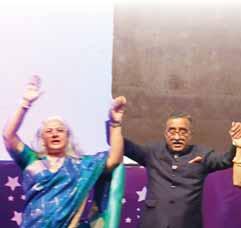

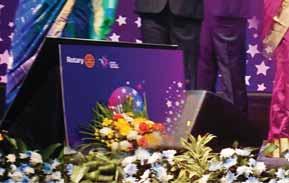
ways across our differences,” the RI President said the wonder of Rotary was connecting the world and its people who we would never otherwise have met and “who are more like us than we would have ever imagined. It connects us to our communities, professional opportunities and to the people who need our help. When you combine this network with the energy and commitment of Rotarians, the results are almost magical. We are people of action, and we have the ability to
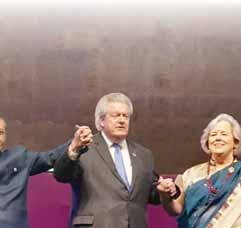


Striking a serious and introspective note at the inaugural session, and addressing the challenges Rotary faces, RI President Mark Maloney said that every year “we talk about the same issues in different ways.” In some parts of the world such as India and Asia Rotary was growing rapidly but not in other parts. “Bringing in more members to replace the ones who leave is not the answer. It’s like pouring more water into a bucket with holes.We need to address the root cause — member engagement and member demographics that are skewed. We have to make some fundamental changes.
We know what the barriers are to engage a diverse membership. It is time to act on what we know.”
And this was to create more membership models, new paths to building more Rotary and Rotaract clubs where the existing club do not meet the current needs.
Expanding Rotary’s reach was just one of the four goals in the new action plan, other three were increasing our impact, enhancing participation and meeting the participants’ needs to be heard and served. “They are seeking experiences that are relevant and fulfilling, and we have to make these available to them, while making Rotary more family-friendly.”
The final priority was increasing “our ability to adapt”, which Rotarians had already proved by succeeding in their careers. “Bringing new approaches to our organising principles do not threaten our sense of who we are. We have to respect professional commitments and not expect Rotary leadership to be a full-time job. Respect the time and responsibilities of younger people who are building their careers. Let’s open up our conversations to diverse voices and simplify how we operate with confidence. Let’s stay true to ourselves by staying ahead of change in our next 114 years,” he added.
From L: Vidhya, Institute Chair T N Subramanian, Nobuko Kita, TRF Trustee Seiji Kita, RID Bharat Pandya,
RI President Mark Maloney, Gay, Madhavi, Rashi, RIPN Shekhar Mehta, Sonal, RID Kamal Sanghvi, TRF Trustees Jennifer Jones and Gulam Vahanvaty.


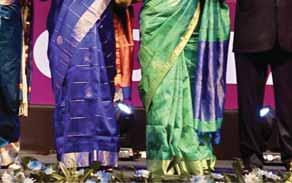







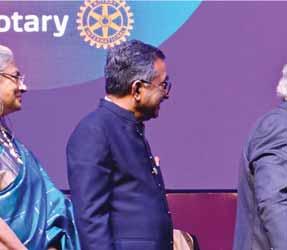
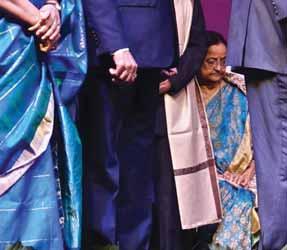



change the world because of who we are and what Rotary allows us to do.”
But fulfilling any vision requires a plan built on a foundation of Rotary connections. “And this year we are rolling out a new action plan which over the next five years will expand our reach, enhance our impact and increase our participation and engagement and increase our ability to adapt. This plan not only brings to life how Rotary connects the world, but is also clear-eyed about the challenges that Rotary faces and is rooted in our historical values of fellowship, integrity, diversity, service and leadership,” he added.
This new action plan also recognises the value of human connections

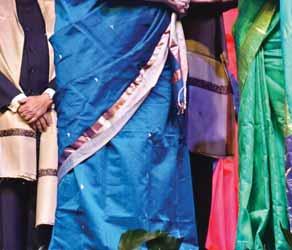
in a time “when technology can make it actually harder to connect. The plan draws on the remarkable capabilities of Rotarians as professionals and respects that younger generations have different ideas about how to spend their time, who they spend it with and what motivates them.”
Rotarians’ ability to make a larger impact is hinged upon more people joining hands with them. Maloney said that by making Rotary larger and more diverse “we tell a wider and more emphatic story and give people hope that the world can change for better. This will create a continuous cycle where more and more people will want to be a part of our amazing success and share our vision.” More members would not only mean more hands doing service projects but also “more brains solving problems.”
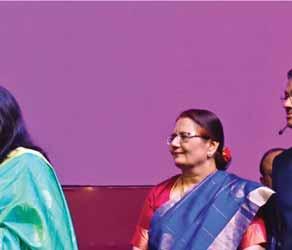
Gay greets Rashi and RIPN Mehta as Sonal, Nayantara Mahajan, Vidhya, Institute Chair Subramanian, Binota, RI President Maloney, PRIP Rajendra Saboo, Madhavi, RID Bharat Pandya and Nalini Prabhakar look on.
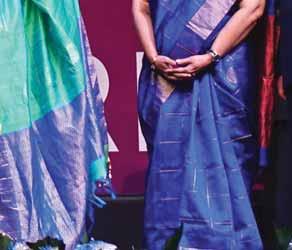
Even as Rotary adapted to change (see box) it would have to safeguard its historic relationships, such as that with the United Nations. “There are so many parallels in the work we do through our areas of focus and the UN’s Sustainable Development Goals which

are incredibly ambitious. Rotary was there at the beginning of the UN, and when the world pulled itself from the brink of destruction and was rebuilt.”
Bringing in more members to replace those who leave is like pouring more water into a bucket with holes. We need to address the root cause — member engagement.
As the UN will soon mark the 75 th anniversary of signing the UN Charter, to celebrate its relationship with the UN, Rotary is hosting four special events, including Presidential conferences in Paris and Rome and a final celebration just before the Honolulu Convention. This relationship was an example of “how together we can serve the world. Alone we cannot provide water for everyone, eliminate hunger or eradicate polio. But together, of course we can. We will build on our proud heritage and thrive for another 114 years because we are not afraid to change,” concluded Maloney.
Pictures by Rasheeda Bhagat

Rasheeda Bhagat
One of the very lively and peppy sessions at the Indore Institute, where you could palpably witness audience participation, engagement and plenty of animated cross exchanges was the panel discussion on ‘Grants and Stewardship’ at the TRF seminar chaired and moderated by TRF Trustee Gulam Vahanvaty.
Incoming Trustee Chair PRIP K R Ravindran, who was on the panel, laid stress on both sustainability and stewardship in doing service projects with TRF grants. Giving an example, he said that domestics couldn’t really be blamed if the employer left money and other valuables lying around within easy reach, or a driver was entrusted with shopping for the house without proper accounts being maintained. “You will lose money because of your carelessness and may end up even sacking that domestic or the driver.”
Similarly, when projects go wrong, Rotarians, who were of course responsible, were blamed but “I would put the bigger responsibility on the DRFC and even the DG. No project is done without the DRFC’s signature, and the DG needs to know what projects are going on in his district.” He is responsible for the money given by his Rotarians and the public. “Both the DG and the DRFC have the responsibility to ensure that money is correctly spent and the DRFC has to ensure the reports are correct.”
His message was very clear: “I am saying DGs who get credit for raising big money also have the responsibility to see that money is correctly spent; otherwise not only their, but also our,credibility is at stake.”
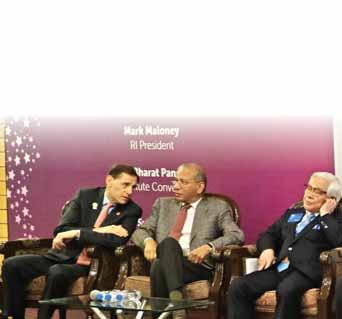
Another panellist, PRID Manoj Desai, who chairs the Rotary Technical Cadre, explained its role: “We are a group of 700 advisors who have volunteered to give our time and expertise
to TRF. They are a silent team but give rock-solid support to TRF.” India has the largest number at 90 members and a first ever seminar to train them will be held in March and 50 have registered.
“They urge Rotarians to plan and execute large and strong projects; many districts consider them TRF policemen!”
Describing him an “anti-moneylaundering expert”, Vahanvaty asked Rajesh Anand from RISAO to talk about stewardship issues in TRF grants. Anand disclosed that the original stewardship assignment was the brain child of the present RI President Mark Maloney and past Trustee Chair Bob Stewart. Stewardship issues crop up “due to lack of project planning and an overdrive. This is a challenge observed frequently where
From L: RI General Secretary John Hewko, TRF Trustee Chair-elect K R Ravindran, TRF Trustee Seiji Kita, RI President Mark Maloney, RIPN Shekhar Mehta, PRIPs Rajendra Saboo and Kalyan Banerjee.





there is no community assessment,” he said. “Also, encourage MoUs with the beneficiary organisations, as they should be responsible for maintenance.”
Ravindran said another major factor in grant approval was the relevance of the project, along with its sustainability. Sometimes the funds were used properly, all bills paid, and there was no misuse. But after completion it was found the project was not as useful as envisaged because the project planning wasn’t sufficient to meet local needs. As an example he gave instances of “putting up hand wash stations in schools with no water supply, or a toilet where the drainage water was not free flowing, so the children stopped

using it; or giving benches to a school which could not conduct classes due to the absence of teachers.”
He said that in a project to eliminate cervical cancer from Sri Lanka, while putting up a DNA testing machine with TRF money, “which would replace the Pap smear that women hate, we got assurance from the government that after the first set of consumables (included in the TRF grant) runs out, the government would replace them. Or else, there was no point in doing that project.” He made the point that unless the goverment furnished them with a guarantee that consumables would be covered in its health budget, Rotarians would not pursue with the project.
Ravindran added: “So essentially, you must satisfy yourself that your project is doing what it needs to do, or else don’t do it.”
RIPN Mehta raised some critical issues of relevance to India with regard to approvals of TRF Global grant applications. That this was a problem facing several Rotarians was evident when others
from the audience raised issues connected with global grants. Some were of the opinion that TRF was not being proactive to the applications from India, especially this being its centenary year.
Mehta said that as Rotary celebrates 100 years in India, Rotarians in the zone are really excited about doing “bigger and bolder projects”. He reiterated that a better understanding is required of the needs and situations in India. “One size doesn’t fit all, it was said, and similarly one mistake is not carried out in all projects. We do half the number of projects in the world. Rotarians in our zones are doing great work,” he said.
If Rotarians needed a better understanding of how to do needs assessment, he had already discussed with Trustee Vahanvaty that a seminar can be held to explain the finer aspects of need assessment. But disapproval of several TRF grant applications is bound to dampen the spirit of Rotarians, he added.
This was particularly relevant in a year Rotary in India celebrates its 100th birthday, “which will not come again next year”, and when the present batch of DGs have committed to doing service projects worth a whopping $350 million, he added.


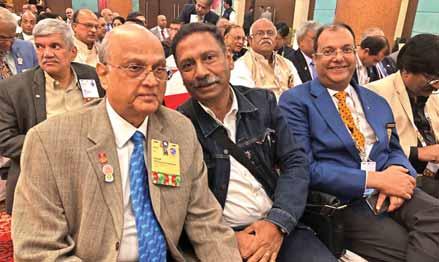

(Ravindran explained to Rotary News later that in some cases there was a philosophical difference in the ways the Trustees of TRF thought and the queries raised by Rotarians connected to service projects. For instance, Trustee thinking is that where ten toilets are necessary in a school, it will not sanction one toilet as it does not satisfy the needs assessment and Rotarians’ funds would be better spent elsewhere in more needy areas. “On the other hand, there is an opposing view that one toilet is better than no toilet! This is a decision that only the Board of Trustees can consider and make. It is not within the domain of staff to make that exception.”)
Trustee Vahanvaty added: “We need to iron out these issues within the policies and guidelines of TRF. Where we need to make some adjustments, we will go back to the Trustees.”
He said, “We have got GGs sanctioned worth $21.5 million; the second country, Taiwan, has got $4.5 million. This is just to put it in perspective; it doesnt undermine what you’ve said.”
On the other hand, a couple of voices were raised supporting the quick approval of grants and leading them was PRIP Rajendra Saboo, who
said, “My experience is that the staff in Evanston is very helpful; where there is deficiency, they point it out, and even reduce the processing time once the urgency of the project is established.”
Proving that as an organisation TRF and RI leadership do respond to the concerns raised by Rotarians, Trustee Chair Elect K R Ravindran, after consulting RI General Secretary John Hewko, who was seated on the dais, made a statement that was received with an appreciative applause. He said: “I promise you that within the next three months, I will personally go into the issues you have raised and give a report to Vahanvaty. We will do an assessment of the number of applications that have come from you, the number that have been turned down, how many have been approved and the total amount of money spent.”
Added a smiling Vahanvaty: “So you can see, we are proactive. None of us want us to be blocks. If we don’t dish out grants, we’re losing the raison d’etre for which TRF was formed.”
Added John Hewko, “I don’t have immediate answers to the concerns you are raising… but it was very helpful to attend this discussion because obviously there is an issue in India in relation to global grants.” He promised to gain “a better understanding” and find out if the rejection of grants in India was higher compared to other regions.
Disclosing an important number, he said that “90 per cent of GGs get approved, worldwide, but if the approval rate in India is 50 per cent — I don’t know what it is — I will find out why. I have been discussing with Ravindran here and we need to look into the reason but I have given clear instructions to the staff when they review GGs, their role is to get to a


‘yes’ and not a ‘no’. Their job is to do everything possible to approve and not disapprove it.”
(Ravindran later told Rotary News that the world acceptance rate of global grant applications was 90 per cent and in our zones 89 per cent in the first half last year. In the second half, the world acceptance rate was 83 per cent; the figure in our zones was 78 per cent.)
Hewko assured the Rotarians that he would get to the bottom of the matter as “enough dust has been thrown up here” and added that while currently most of the work on grant applications was being done in Evanston, “our long term philosophical approach and instructions to the team are to start preparing to push approval and closing functions out of Evanston to the regional offices. Closer to the time zones there will be a better realisation
of the needs and the realities there; that is the long-term strategy.”
But the flip side of “pushing decision making authority to the regional offices is that there have been instances of extraordinary pressure being put by senior leaders and other Rotarians on the staff, making it very hard for them to objectively implement Trustee policies. Staff does not make policy, we only implement what the Trustees have asked us to do,” he added.
The lively session closed on a positive note when one of the delegates spoke in glowing terms about the prompt attention his applications had received, the helpfulness of the RI staff, and a 100 per cent approval of all their applications.
Pictures
by Rasheeda Bhagat Designed by N Krishnamurthy




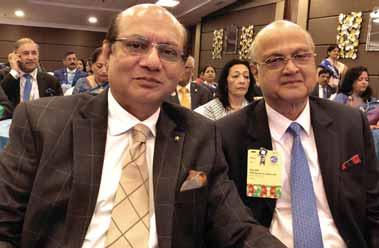





Above: TRF Trustee Chair-elect K R Ravindran shares a lighter moment with Nalini and PRID P T Prabhakar.
Right: RID Kamal Sanghvi and Usha Saboo.
Below: With a straight face: RIPN Mehta cracks a joke to PRIP Kalyan Banerjee, who is seen still laughing as Mehta moves on to greet PRIP Rajendra Saboo. RID Bharat Pandya is seen in both the pictures.

President Maloney and Gay. Also seen: Trustee Chair-elect K R Ravindran and Vanathy.











L) PDGs Ramachandran
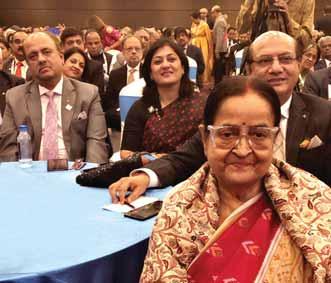







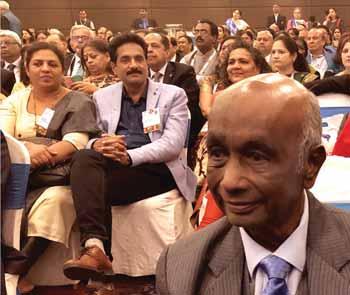






Rasheeda Bhagat
At the TRF dinner at the Zone Institute in Indore, Trustee
Chair Representative Trustee Seiji Kita said that TRF was very happy with its peace programme; and “continuously planning to expand the certificate programme. Four more peace centres are to be opened by 2030. The first will be in Uganda, Africa, and will be opened in 2021.”
Underlying the importance of having a robust peace programme
at a time “when violence, conflict and terrorism prevail”, Kita said the Rotary peace centres assume great significance. They have “trained 1,300 scholars and about 40 per cent of them work with non government organisations, 15 per cent with government agencies, and others are at the UN agencies, in research, academics and other areas. We are very proud of our peace programme…. as much as we are of

our polio eradication efforts,” he said and thanked and congratulated PRIP Rajendra Saboo “who played such an important role in the establishment of the peace programme and peace centres.”
Trustee Gulam Vahanvaty was happy to note that “last year saw a


Above: EMGAs Vinod Bansal, Sam Patibandla, Trustee Vahanvaty, RID Kamal Sanghvi, Trustee Kita, President Maloney, Vidhya, Institute Chair
T N Subramanian, RIPN Shekhar Mehta, Trustee Chair-elect K R Ravindran and RID Bharat Pandya.
Right: AKS Members Keshav Kunwar and Durga with (from L) Trustee Kita, President Maloney, RIPN Mehta, Trustee Chair-elect K R Ravindran and RID Pandya.
record giving to TRF of $395 million. In this worldwide giving, India was No 2 with $ 21.4 million. Two Indian districts emerged the top two giving districts in the world — RI District 3190 at No 1 and RID 3142 at No 2.”
What was more, he added, of the 50 top-giving districts in the world, nine were from India, with RID 3011 being at No 9.
Vahanvaty said India’s role in strengthening “our Foundation continues unabated; Endowment fund contribution last year was the second highest in the world next only to US. We want to be a major player in reaching the Endowment goal of $2.025 billion by 2025.” He was confident that the tempo for giving across India will continue. “There will be no slowing


down; we will surpass our goal of raising $30 million this year.”
But, he added, “we still face challenges in the Annual and PolioPlus fund contributions. They are very important too. In addition to Major Gifts, Rotarians’ participation through small gifts needs to be encouraged for both these funds.”
He was happy to find that more and more Indian corporates believe in TRF and know they can trust it. In November, he had visited six Rotary districts in India and found everywhere that the governors and Rotarians were committed and motivated to giving. At the TRF seminars in these six districts, over $100,000 had come in actual contributions and commitments were made for more in each of them.”
Complimenting the current set of DGs for doing very well in TRF contributions, he said, particularly in RID 3240, given the huge geographic area in the north-eastern region, four TRF seminars had been held. He had attended the one in Guwahati and found the response to be “overwhelming. Let us keep up the momentum and maintain the high standards of stewardship,” Vahanvaty added.
Addressing the meeting and calling The Rotary Foundation the “backbone” of RI, RI Director Bharat Pandya said a record attendance of 400 Rotarians at the TRF dinner “speaks
about your commitment and dedication to TRF.” By working through TRF, “we change the world and make it a better place. Our work starts at our doorstep and reaches parts of the world we’ve never been to, or seen and will never see. Helen Keller was once asked is there anything worse than being blind and she said ‘Yes, having sight but no vision.’ It is TRF which give Rotary and Rotarians that forward looking vision to work towards a better tomorrow.”
He added that projects done with TRF grants benefit millions, “providing water for the thirsty, food for the hungry and shelters for the homeless. TRF is the perfect example of the power of one… one Rotary club, one district, multiplied many times over.”
RI General Secretary John Hewko, who inducted two AKS members, PDG J B Kamdar and Marlene (the Chair circle with a contribution of $500,000) from RID 3232 and Kishorilal Jhunjunwala from RID 3142, said the Arch Klumph Society was growing rapidly, and now has 1,000 members, with India having the second highest number of AKS members. “At the One Rotary Centre (in Evanston) we have a nice AKS
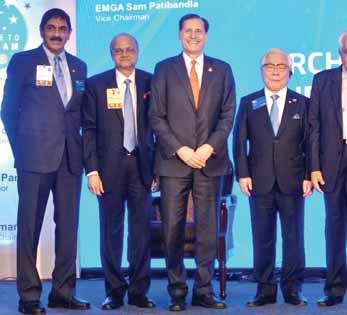

gallery on the 17th floor. When we set it up a few years ago, we figured we had at least 10–15 years left before we ran out of space. But the AKS has exploded with so many generous donors that we anticipate it will need to be expanded in five years.”
EMGAs Sam Patibandla and Vinod Bansal introduced the Major donors and two AKS members.
Kamdar said he and Marlene, came from families with “modest
There will be no slowing down; we will surpass our goal of raising $30 million this year.
Gulam Vahanvaty TRF Trustee
means but richness of heart and a philosophy of sharing. We have seen the entire spectrum of ups and down. We began our married lives with financial uncertainties of an enormous



kind. So as we struggled with our family-owned business we became the beneficiaries of help from many good Samaritans.”
As their business improved, they met Mother Teresa, who asked them
A K S Members Kishorilal
Jhunjhunwala and PDG
J B Kamdar and Marlene, with (from R) EMGA Bansal, President Maloney, Trustee
Kita, RI General Secretary John Hewko, Trustee Vahanvaty and EMGA Patibandla.
to “give till it hurts, and then some more.” Around the same time he met veteran Rotarian Kris Chitale in Chennai, “who introduced us to Rotary and became our mentor.” Kamdar admitted that money for his first donation of $1,000 to become a Paul Harris Fellow was the most difficult to raise. “And I had doubts about how my money would be used. But my friend Kris, who used to talk frankly like Ravi (PRIP K R Ravindran), said: ‘JB, have some faith, your money
will be leveraged and used to a much better effect.’”
Jhunjhunwala said he was humbled by the recognition and added: “We make a living by what we earn but we make a life by what we give.”
A Rotarian since 1989, he always had the desire to do something for society and as a successful professional felt that life is a two-way process and those who have more wealth must share it with others.
Other TRF benefactors recognised were Lalit and Neelu Khanna (RID 3012), Girish Govind and Sanjeevani Gune (3131); Manish and Mona Gyani and Kulbhushan and Manju Jetly; T N Subramanian and Vidhya (all from 3141); Debashish and Charismata Das (3240); Keshav and Durga Kunwar (3292); Kiran Lal Shrestha (3292); Ravi Raman and Shobana (3232); DG A K Natesan and Parvathy (2982).
Pictures by Rasheeda Bhagat

The Polio Pioneer Award was presented to PRID Ashok Mahajan by RI
President Mark Maloney in the presence of RID
Bharat Pandya and TRF Trustee Seiji Kita.
“End Polio Now as a tribute to his efforts in pioneering polio eradication designates
Ashok Mahajan as PolioPlus Pioneer,” reads the citation.
As the Chairman of the Rotary-Muslim Ulema Council since 2006, and
member of the Rotary International PolioPlus Committee between 2009 to 2013, Mahajan has been one of the forerunners in making India polio-free.

Highest Contribution to Annual Fund3141
Highest Contribution to Endowment Fund 3060
Highest Contribution to Polio Fund3060
Highest Per Capita APF Contribution to TRF3141
Highest Total Contribution to TRF 3141
Shashi Sharma
Pinky Patel
Pinky Patel
Shashi Sharma
Shashi Sharma
Nitish Laharry Trophy Highest Total Contribution to TRFSuresh Hari3190
Binota and Kalyan Banerjee TrophyHighest Endowed Fund Contribution to TRFSuresh Hari3190
Usha and Raja Saboo Trophy
Highest Annual Fund Contribution to TRFShashi Sharma3141
Usha and Raja Saboo Trophy Highest Polio Fund Contribution to TRFGuddati Viswanadh3020




Highest Contribution to Annual Fund3190Suresh Hari
Highest Contribution to Endowment Fund 3190Suresh Hari
Highest Contribution to Polio Fund 3020 Guddati Viswanadh
Highest Per Capita APF Contribution to TRF3190Suresh Hari
Highest Contribution to TRF 3190Suresh Hari
Highest Contribution to Annual Fund3291Mukul Sinha
Highest Contribution to Endowment Fund3291Mukul Sinha
Highest Per Capita APF Contribution to TRF 3291Mukul Sinha
Highest Total Contribution to TRF3292 Chintamani Bhattarai

Trustee Chair-elect Ravindran and Trustee Kita present an award to PDG A V Pathy and Veena. RRFC Avinash Potdar and EMGA Patibandla are also present.

Highest donor participation
Zone - 4
3131 PDG Shailesh Palekar
Zone - 5
3181 PDG P Rohinath
100% Club Participation
Zone - 4
3132 PDG Vishnu Mondhe
3142 PDG Ashes Ganguly
Zone - 5
2981 PDG S Piraiyon
3182 PDG Abhinandan Shetty

PDG Shashi Sharma receives an award from RI President Maloney in the presence of RID Bharat Pandya and PRID C Basker.

PDG Pinky Patel receives her awards from Trustee Kita in the presence of her husband Sumul Patel, PRID C Basker, Trustee Vahanvaty and Trustee Chair-elect Ravindran; Left: Trustee Kita presents an award to PDG Vishnu Mondhe and Manisha in the presence of Trustee Chair-elect Ravindran and RRFC Vijay Jalan.
Next issue: Membership and PI Awards.

Jaishree
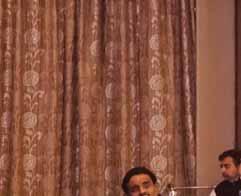

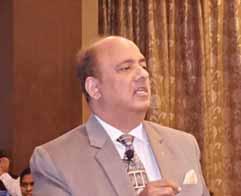



RIPN Shekhar
Mehta exemplified the Indore Institute’s theme — Dare to Dream — in his address to the governors-elect.
“You all have been eagerly waiting for this moment… Apna time aayega… and your time is now,” he said, quoting from the popular rap song in Gully Boy.
“If this was a FICCI or an Assocham meeting, those participants couldn’t change India as much as 40 of you can. Remember we
eradicated polio. Understand anything is possible for us Rotarians. Rotary is all about philosophy. It is how you think you are — big or small,” he asserted, setting out three tasks for the DGEs — dream big, set clear goals and delegate.
“You have to build hospitals and schools, and not just give books and pencils. Redefine your dreams and look for opportunities to break the mould,” he said, recalling how Rotary built 500
homes after the tsunami in a remote island in the Andamans. “We could only see a brown patch from the helicopter. The entire island was wiped out. We brought it alive in three months at a cost of `2.5 crore. All this is possible only if you think from the heart and not the mind,” he said, adding instances of how PRIP Kalyan Banerjee announced in Kathmandu that Rotary will make India totally
literate and the historic initial project to vaccinate children against polio in the Philippines in 1979.
“James Bomar, then RI President, wouldn’t have dreamt that we will be spending billions of dollars to wipe out the disease from the world.”
He urged the delegates to build castles in the air.
“Let people laugh at you. If you have the courage to dream big and follow it through, you will have the last laugh.”

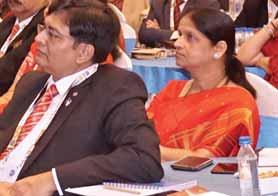
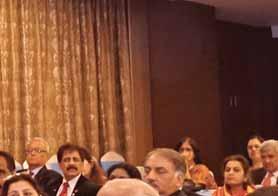
RIPN Shekhar Mehta addressing the DGEs and their spouses.

Urging the DGEs to have a vision, Mehta gave the example of Disney World. “We all have seen mice. But who would have ever thought of creating an entire empire around one? When Disney World was inaugurated, Walt Disney was not alive. The CEO said to Disney’s wife seated on the dais, ‘I wish Walt could see this.’ Her epic reply was: ‘Only Walt could see this.’”
He added that Isaac Newton formulated the law
of gravity after an apple fell over his head. “I would have either cursed myself for sitting under that tree or just picked the apple and eaten it.”
Set your goals
He asked them to set clear goals. “If your club has done 100 heart surgeries this year, 102 next year is no goal, but 125 is a good one. My newest slogan for you is add a zero to anything that you have planned.”
Quoting former President of India Abdul Kalam about dreams that don’t allow one to sleep, the RIPN said, “I have lots of sleepless nights, nothing to do with my business. But when a thought comes as to how to make India literate, I am happy that I have those sleepless nights.”
Having set the goals, the next step is to delegate. “You have two hands; only the women sitting here have ten hands like Maa Durga. Don’t try to emulate them.
If you have ten hands, you’ll be Ravan. Who built the Taj Mahal? The masons. But does the history book say so? So delegate your work, credit will automatically come to you,” he said and shared his trainer’s advice to him when he was a DGE. “It still rings in my ears. He said that a governor’s job is to lubricate the egos of the club presidents. The same goes for the club president. He just has to pat a club member on his shoulder and say, ‘Good job. Well done.’ It will work wonders.”
It is okay to fail, he said, citing how Amitabh Bachchan was rejected by All India Radio because his voice was not good. “Can there be a bigger joke? Look where he has reached today. It is alright to fall. But you should have the tenacity to get up. Remember this is an opportunity for you to serve the best for humanity. Let membership be your topmost target. Drive every member to introduce just one member to Rotary and see how membership doubles up. Let us work steadfastly to make India totally literate by 2025,” said Mehta, wrapping up his pep talk.
Picture by Jaishree

Rasheeda Bhagat
Underlining the importance of king-size dreams and explaining the message behind the Indore Institute’s theme ‘Dare to dream’, RI Director Bharat Pandya said that over 100 years ago, just when “Rotary was taking its baby steps”, an Indian entrepreneur, Jamsetji Tata put in his tender to supply steel rails to the British rail company. Its director made the scathing remark that if an Indian manages to make rails to British specifications, “I will eat every pound of steel if he is
I will eat every of steel if he is able to deliver. I do not know whether
he ate all that steel, but not only did the Tatas supply steel to British rail, in World War II, the British tanks were called Tatanagars because the steel used to make those tanks came from Tatanagar, India!”
Birla, Ambani or Narayana Murthy, these are people who dared, dreamed and achieved,” Pandya said.

In 1964, when Muhammad Ali fought Sonny Liston in the world heavyweight championship, Liston was the king and Ali was an underdog. But Ali knocked him down in the sixth round, “proving the adage that it is not the size of the man in the fight that really matters, but the size of the fight in the man. Whether it was Tata or G D
Similarly, in Rotary too, Paul Harris on Feb 23, 1905, thought of a world fellowship of likeminded individuals, people of integrity, united by the ideal of service and thus the Rotary journey began. As the journey progressed others joined and together, Rotarians dreamt big and achieved big.
“I too have a dream, to work for Rotary and with Rotarians, to make our communities and our world a little
really matters, but the size of the our our a better. My dream tells me to make the
Mayor of Indore Malini Gaur being honoured at the Indore Institute. (From L) Madhavi Pandya, RI President Mark Maloney, Gay, RI Director Bharat Pandya, Institute Chair T N Subramanian and Vidhya.



most of this opportunity given to me. I consider the RI Director’s role not as a position of power but responsibility and my dream tells me to do my best in this important responsibility, to work for membership and TRF and to take Rotary forward.” While doing so, his focus would always be partnerships because together “we can achieve much more than when we work alone and because that will make our work more impactful. My dream also tells me to focus on integrity at all levels.”
Quoting from India’s ancient texts he said: “The only thing that walks back from the tomb along with the mourners and refuses to be buried is a man’s character… it outlives the person and can never be buried.”
But to achieve big, Rotarians would have to think differently. Striking an introspective note, Pandya said the perfect world should be one where an note, said the world should be one where


there is understanding, goodwill and peace. “But look at the world we live in, open your newspapers or TV sets… war, terrorism, corruption, starvation, rape and other images of darkness fill up media space. And in the midst of all this darkness we wonder whether the work we do for Rotary — a big
project there, a small one here, can it really make any difference.”
But, as Confucius said, it is better to light a candle than to curse darkness. “That is the opportunity and responsibility that Rotary places on us... to light a candle of service. But one candle is not enough, we need hundreds and
TheInstitute honoured the woman behind Indore emerging the cleanest city in India for three years in a row — Malini Gaur, the Mayor of Indore.
Addressing the meet, she recalled how in 2014, Indore was near the bottom of the cleanliness chart and the burning of waste was continuously producing harmful gases and its greenery was being depleted substantially.
With the cooperation of “all the elected representatives and people of Indore without whom I could have achieved nothing,” she took on the challenge of transforming the city.
Saying “apne liye jiye toh kya jiye (what’s the point in living just for oneself alone)”, she added that when she became an MLA — she is still one — she wanted to do something for her city, and her country and this dream was realised when she first became Mayor. “When the Prime Minister announced the Swacch Bharat Abhiyan, we made swachchata our mission and I am so grateful for the way the Indore people supported me. Some tough decisions had to be taken, but today there is so much awareness on the need for cleanliness.”
Recalling her journey, the Mayor said she began with one smart ward and “when we succeeded with that, we implemented the exercise in all the 85 wards in Indore.” The funds that the city got under the swachchata mission, were invested for vehicles and equipment for garbage collection and processing. “We segregated solid from liquid waste, providing two different boxes.” While from liquid waste organic fertiliser is manufactured, solid waste is also segregated and used for making roads, plastic pipes, etc.
Malini added that the city has a big vegetable market, “which generates a lot of vegetable waste. We have put up a `7 crore-plant to make methane gas from vegetable waste and 15 to 20 of our city buses are getting their fuel from it.”
Doctors have gone on record that thanks to this initiative — Indore has got the cleanest city award for three years, the incidence of diarrhoea, malaria and asthma has come down. “Aur ab hum chokka lagane ja rahey hei (we are expecting to score a fourth win this year!)”
RB
thousands of candles if we are to make the world a better place.” This is where RI President Mark Maloney’s call to “grow Rotary” assumed significance.
Pandya disclosed that in 2007, as the DG of RID 3140, he and Madhavi “were fortunate to have Mark Maloney and Gay attend our district conference as the then RI President Bill Boyd’s representatives. And today, as your RID, we are extremely happy to welcome him as the RI President and Gay, here in Indore.”
Urging Rotarians to take inspiration from pioneers such as Verghese Kurien who had revolutionised milk production in India, after a taunt by a British milk expert that the sewerage water of London was bacteriologically superior to the milk of Bombay. Today Amul is not only a household word but India is the largest milk producing country in the world. Pandya said that when one dreams, takes up challenges and has “an unwavering belief in oneself, that is the stuff of miracles.” Just like Neil Armstrong had taken the first step on the moon, so also Paul Harris


had started Rotary as a small organisation. “But look at where Rotary is today — 214 countries, 1.2 million Rotarians doing the work of Rotary service day after day.”
Similarly, Jonathan Livingston Seagull was also a story about and for Rotarians, as it revealed that only the gull who flies the highest sees the farthest; “those who dream and dare, win. But Rotarians require additional important qualities, such as love and compassion. Compassion is not

sympathy but empathy for the needy, underprivileged, which allows us to work to make our world a more equal place. Do service with love, kindness and compassion, because this is the language that the deaf can hear and the blind can see.”
Pandya added: “The miracle of our lives is not to fly or walk on water but to walk well in this world and make it special.” In our zones Rotarians were doing some amazing work… supplying school benches to hundreds
Maloney greets Binota and PRIP Kalyan Banerjee as President Maloney, Vanathy Ravindran, Madhavi and RID Bharat Pandya


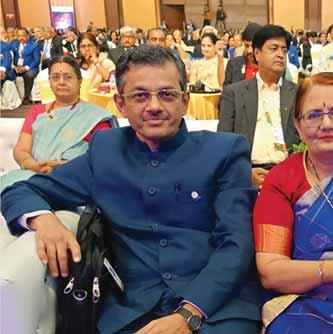

also seen in the picture.
of schools, conducting polio rallies, camps for medical ailments, giving handicapped dignity; critical medical services such as paediatric cardiac surgery, blood, eye and skin banks and life-saving equipment to hospitals, building toilets, putting up hand washing stations and making villages ODF. This was possible because 150,000 Rotarians were working with commitment, competence and compassion
Continuity and working together in harmony were the essence of such success. Madhavi and he had an excellent relationship with RI Director Kamal and Sonal Sanghvi, and TRF Trustee Gulam Vahanvaty. In 2018–19, our zones had contributed $21 million to TRF, with two RI Districts — 3190 and 3141 — emerging the top two districts in the whole world. For this, the hard work
done by the 2018–19 governors and the “excellent leadership” provided by PRID C Basker were responsible. He recalled how as a young medical student his father, a senior doctor with 40 years’ experience, had told him that he had prescribed all kinds of medicines, “but the one which works the best for patients is compassion. I asked him: ‘Dad, what if that doesn’t work?’ He replied: ‘In that case, double the dose!’ Yes, compassion is the key to dealing with not only patients but every human being.”
Working with youth had always been important to him, the RI Director said; “whether it is interacting with Rotaractors or chartering 23 Interact clubs in a single day, installing a 26-year-old president of an under30s Rotary club, or chartering a nextgen couples club for people between 25–35. And for the first time we have Rotaractors (DRRs) at an Institute,” Pandya said, thanking PDG Ashish Ajmera for his help in getting them.
Institute Chair T N Subramanian said everybody had wondered why the Institute was held in Indore. “Why Indore, so many people asked me,” he said at the inaugural. But, when RID Pandya had given him the theme “dare to dream”, the more he thought about it, the more Indore, which had been topping the charts for the last few years as the cleanest city in India, had suggested itself.
A few years ago, Indore was among the dirtiest cities, but the sheer resolve shown by a single woman (Mayor Malini Gaur who addressed the inaugural session) who dared to dream about a clean city “and worked for it, walking around the streets at midnight, inducing in the citizens a sense of pride in the cleanliness of their city, brought about a massive change. These are the kind of dreams we need to have in Rotary… just like our dream of eradicating polio.”
Pictures by Rasheeda Bhagat Designed by N Krishnamurthy

Rasheeda Bhagat
To the graduating governorselect at the Zone Institute in Indore, RI President Mark Maloney had a four-word message — You are the key. This, he disclosed, was the theme of RI President Ed Cadman (1985–86).
Addressing the convocation ceremony, Maloney said: “I’ve been a Rotarian for a long time, some say for so long that Paul Harris and I were associates. But that’s not quite true.”
But with 39 years in Rotary he had a history to draw upon. He became club president in 1985–86, when the then President Cadman gave this theme. They would be responsible for motivating the club presidents and all Rotarians in their districts in 2020–21 to “perform service to


increase the impact of Rotary and to make a difference.”
This class of governors would be the last one to participate at the International Assembly in San Diego. Next year (Jan 2021), the IA moves to Orlando.
“My message to you today is simple. You are the key; between now

and July 1 is the most important time of your governorship,” even though they weren’t governors yet. “Because, if you don’t plan it out before July 1, it is probably not going to happen. I hope these two days of the training seminar have given you a good idea of what you want to see your district accomplish in 2020–21.”
DGEs and their spouses with GETS Co-chair Rajiv Pradhan, Marlene, GETS Chair J B Kamdar, Sonal, RID Kamal Sanghvi, President Maloney, Gay, Madhavi, RID Bharat Pandya and TRF Trustee Gulam Vahanvaty.
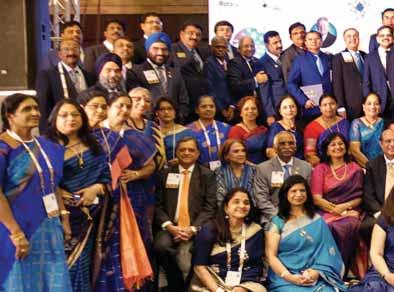

Their objective, or role, said the RI President, was not to garner accolades for themselves. “The sign of a true leader is to lead others to perform service and undertake their obligations, and give credit to others for what happens. If you can accomplish that, if you can walk into the office with the humility and leadership in such a way that those who are in your care during the year feel that they have accomplished and they deserve the credit, you would have done your job.”
Addressing the new graduates on “Exceeding expectations”, PRIP Rajendra Saboo told the Class of 20–21 to always remember that “your spouses are the backbone and your strongest support in becoming successful governors.”
He cautioned them to make good use of their GML to stay in touch with the Rotarians in their district, and not palm off the responsibility of writing their monthly message to the editor or an assistant governor. “I find this a very common practice these days; please understand it’s the
DG’s monthly letter... a personal communication of ideas from the DG to the Rotarians and cannot and should not be done by proxy.”
Saboo also warned the governors that they should not see their position as an opportunity to climb the “social ladder”, and said he had known a DG who had put a bold nameplate on his car, proclaiming himself “Governor”, even putting a red light on top of his car along with a flag. “When he came to meet me, I saw his car and asked him politely why this show off? Well, his distorted ideas of authority, ethics and values were totally forsaken and he said that it demonstrated his authority as an important person, and wherever he goes, the policeman salutes him.”
The legacy he left behind was starting of new clubs where his family members were made club presidents, abusing TRF grants and ending up “behind bars, his own and Rotary’s image totally damaged. So please have higher and loftier expectations from yourself, and make a place in the hearts of Rotarians and the community.”
Advising them against selfpromotion through books and videos

“which nobody has the time to read or see”, Saboo recalled his own term as governor when he put the best people in his team, irrespective of whether they had voted for him or not. “If you do that, you will have an excellent team along with perfect harmony in your district.”
He also urged the incoming governors not to neglect their families, recalling how when he became DG, their younger son, only 12 then, asked his wife Usha: “‘Now that Dad will become governor, will I have to ask his secretary for an appointment to meet him?’ We realised the disconnect. We took him with us to the IA and the convention. He was impressed with Rotary and is a Major Donor of TRF, being an AKS member, but he has not become a Rotarian, perhaps because he felt Rotary took away his parents from his childhood.
Please do not ignore your family, or your business. Be with your children and don’t think of making Rotary your career. You will need them both once you are done with your year.”

Saying he was fortunate to have Usha, who was “totally servicefocused”, as his wife, he recalled how she had helped make blood donation a successful district project, and even made him donate blood despite his mortal fear of the very sight of blood. “But she said you must have courage and chanting the Hanuman Chalisa, I did my maiden blood donation.”
Saboo advised the DGEs to plan great service projects, set goals and “then go all out to achieve them. Do not depend too much on accolades and compliments. Your own heart, inner voice will tell the truth. Stop pushing so hard on the door looking for happiness, because that door opens inwards.”
Pictures by Rasheeda Bhagat

We are a $2

V Muthukumaran


Institute Convener RID Bharat Pandya honours RI General Secretary John Hewko in the presence of Margarita Hewko and Madhavi.


Where will Rotary be in the next 10 years? Will it still hold relevance to diverse professionals to do service projects? How is it going to handle the demographic challenge of binding people from two extreme stages of life? “This is really a great, hard circle to square, that is, having 75-year-old, retired people as members along with young 35-year-old professionals in the same club, feeling comfortable with each other and working in the same way,” said RI General Secretary John Hewko, addressing a Q&A session with RID Bharat Pandya at the Indore Institute.

Historically, Rotary has been a one-product shop as it offered a one-size-fits-all model, he said. “But we can’t afford the luxury of being a one-product shop any more. Our alternative products — young, classic, traditional or club model — should appeal to diverse demographics.” One of the strategic plans is to develop alternative paths for joining Rotary and it is a challenge to make it happen.
In the last 114 years, Rotary has done some amazing projects. An organisation of over 100 years has “this trajectory of booming, growing, thriving and reaching a certain plateau in its natural course of history and then a gradual decline before reaching a point of no return, if it does not take measures to stem the rot and deal with this downward curve,” he said, citing the case of Kodak losing relevance

after its grand presence as it did not deal with the steady decline in the growth curve. Rotary is in such a situation now as it grapples with a stagnant membership of 1.2 million and the need to infuse young professionals. Hewko believes Rotary can buck this trend, by taking “concrete action” on the new Strategic Plan which will be rolled out by the RI Board shortly.
While keeping it relevant over the next few decades will be a challenge, “there should be a continuous process of improvement and adapting to changes.” Are we going to be ‘nimble enough’ to adapt to changes, especially in technology, and deal with challenges we and other NGOs are facing?
Rotary has institutionalised discontinuity for very good reasons, he said. “We as an organisation are resigned to be discontinuous by design. Our president, RI Board, DGs and club presidents change every year. We need to have 10 years of continuous, consistent efforts to deal with challenges.” But there will be a time when we need continuity and that will be a problem. “We have to stay the course and avoid the zig-zagging that results in the encroachment of our governance structures.”
We have to respect the levels and at the same time, maintain the glue that binds us all in Rotary.
elevated Rotaract as part of Rotary. How are we going to operationalise this? We have to be careful as we roll out this plan of action with Rotaractors becoming part of us.”
In a nutshell, relevance, adapting to changes, continuity, next global project, regionalisation and the new concept of Rotaract will be the challenge areas for Rotary in the years ahead.
Confident of taking the membership to 1.4 million Rotaractors and 1.4 million Rotarians in the next 10 years, Hewko said young, sharp minds should be given an opportunity to “roll up their sleeves and get the job done in Rotary.”
Rotary is in such a situation now as it grapples with a stagnant membership of 1.2 million and the need to infuse young professionals.
“We have to work on alternative models with bottom-up approach that are easily scalable, and replace polio as the next big thing for Rotary,” said Hewko. The next challenge is regionalisation. There are now increasing differences within Rotary around the world. “We have to respect the differences at the regional levels and at the same time, maintain the glue that binds us all in Rotary,” he said.
The organisational values and things that bring us together such as youth exchange, fellowship, global grants, and all the work we do have to be kept in mind. Finally, “we have
The amount of money raised by Rotarians across the world through TRF giving, membership, grants and other donations is valued at $1.25 billion a year. “Now, if you add value of our volunteer time, $850 million (calculated by Johns Hopkins University) and the money we raised, we become a $2 billion-a-year NGO, one of the largest such organisations in the world right up there with Gates Foundation,” pointed out Hewko.
He reminded the Rotarians that by 2025 Rotary has to grow into a $2.025 billion NGO. “You are leading the way in India with your support. This goal is the most underlying financial foundation of Rotary going forward,” he said.
Picture
by V Muthukumaran

The Indore Institute had special sessions to prepare the partners to support the DGEs. Gay Maloney said: “You are the eyes and the ears of your DG-spouses.”
Usha Saboo, Gay Maloney, Vanathy Ravindran and Margarita Hewko enthused the partners, all except one — PDG Vinay Kulkarni from RID 3131 — being women.
The partners make a huge difference in the way the governor functions, said Gay, and urged the spouses to wholeheartedly participate in the International Assembly (IA). “It is easy to go there and stay within your national
group. But do meet the partners of DGEs from other parts of the world, so you get to know the culture of their land, the people and their needs.” She narrated how she travelled across the world with her husband Mark Maloney now and when he was DG. “In 1998, we participated in an NID here in India. It was overwhelming to see families bringing their little children for polio immunisation.” Later in 2007, they were back as President’s Rep, and visited the slums of Mumbai where the local Rotary club had revived a water body. “It gave us so much pride to see the good work done by Rotary.”
Usha, spouse of PRIP Rajendra Saboo, has seen Rotary for over five decades and participated in several service activities here and overseas. “The most rewarding and dear to my heart are the medical missions. In Oct 1988, life started afresh for me at 60 while serving my first medical mission to Uganda.” Twenty years and over 40 missions to Africa, India, S E Asia, Mongolia, later “for both of us these have become a passion… a very happy addiction.”
Usha was initially hesitant when she participated in the first medical mission as she “is not a qualified doctor. But when I saw the long queue of suffering


people I knew my calling. No work is big or small, when done willingly and lovingly. Whether giving medicines to patients or bandaging, serving coffee to the doctors, pacifying a crying mother or giving a warm hug to a child going in for surgery. Serving in the medical mission I have understood the true spirit of Rotary.”
This experience had taught her many valuable lessons. “The desperation of little children badly crippled by polio, crawling in dust; the helplessness of old people having lost both their eyes to cataract; the desolation of a mother whose child is suffering from a rare heart disease. I have seen fear of death written large on the faces of young people suffering from AIDS and the badly disfigured faces of the Rwanda Civil War victims. Seeing all these sufferings made me strong when I developed the pink and brown patches of leukoderma all over my face and body. I looked horrible. But I thanked God that it was neither contagious nor disabling. I moved on in life with courage,” she said, amidst applause.
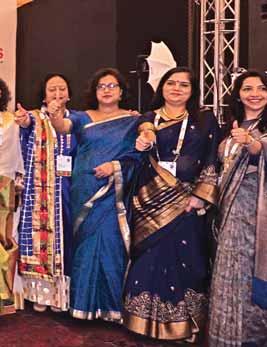


She elaborated on the schools built in Sri Lanka by Rotary post the 2004 tsunami. The areas were planted with mines by militants. With international support and immense courage, the Rotarians led by PRIP K R Ravindran rebuilt 25 schools from where 14,000 children pass out every year. In Uttarkhand after the massive earthquake in 2013, PRID Y P Das led the rebuilding of 32 earthquake and landslide-resistant schools in Rudraprayag, she said.
Similarly, RC Chandigarh supports heart surgeries for the underprivileged and RID 3080 celebrates Diwali with the Army jawans serving in Kargil and the Siachen glacier by sending them sweet boxes. “To keep the soul of Rotary alive and vibrant, we must engage ourselves in more such humanitarian activities with compassion and care. We must keep district events and even Zone Institutes simple with service and giving as focus. This transformation arising from self to service above self is the power of Rotary,” she said.
Vanathy Ravindran urged the partners to be proactive and understand the basics about their districts — how many clubs are there, the length and breadth of your district, membership growth or loss, type of projects the district is doing.
Getting to know the spouses of each club president will be a huge bonus.
DGs have to raise funds for the Foundation. Vanathy related Ravindran’s practice of giving the first cheque to his club at the beginning of every year. The amount may be big or small. But because he gives first, he has no qualms about asking others for money for the Foundation. “Not only should you encourage your husband to give his first cheque, but also make it known to others that he has your blessing to do so,” she said.
Dr Madhavi Pandya reiterated the importance of the spouse’s support for the success of the district leader. It takes two wings to fly, she said. Her advice to the Rotarian spouses: Meet people with a smile. Be constructive and thoughtful. Encourage small projects and harvest their talent.
“I have this one year and I will live it up — this should be your motto. Do all that you possibly can,” said Sonal Sanghvi.
Rotary need not take precedence over your home or work. Carefully plan your year so that none of the three suffers, said Margarita, wife of RI General Secretary John Hewko.
The programme was chaired by Madhavi. Sonal and Marlene, wife of PDG J B Kamdar, were co-chairs.



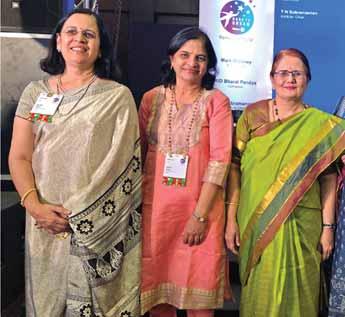







PRIP Rajendra Saboo, Usha, PRIP Kalyan Banerjee, TRF Trustee Chair-elect K R Ravindran, Vanathy, RID Kamal Sanghvi, Sonal, TRF Trustee Jennifer Jones, RI General Secretary John Hewko and Trustee Gulam Vahanvaty in a procession at the Institute inaugural.












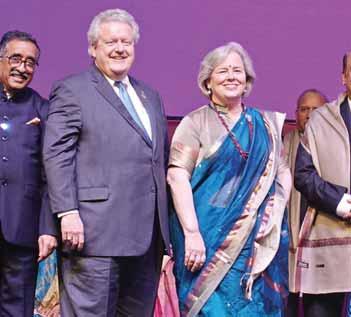








Sergeants-at-arms: (from L) PDG B
PDG J P
TRF Trustees
DG


RI















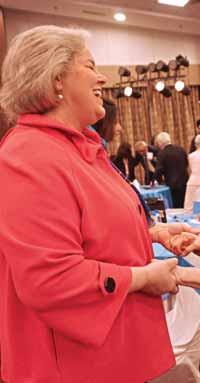



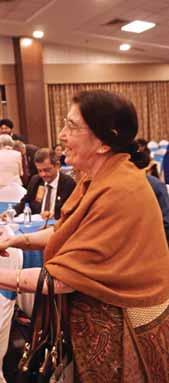






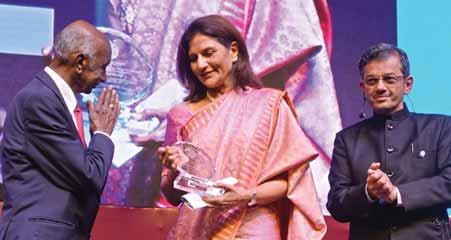



Incoming TRF Trustee Chair K






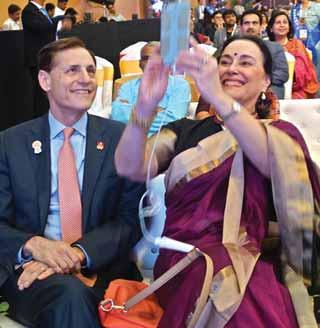


Rasheeda Bhagat
Coming as she did in the backdrop of a slew of violent acts of rape and burning alive of women, Union Minister of Women and Child Development Smriti Irani wowed the participants at the Indore Institute with her strident call for the urgent need for gender parity.
Answering a question from Convener and RI Director Bharat Pandya on a woman’s comment that ‘I always have to do my best, because if I fail people will say not I but women always fail’, she said, “Actually, a woman always


has to do better than the best because if she fails, it is looked upon as a failure of both her gender and also the cause.”
Maintaining that there is this “ingrained bias against women” in our society, she gave the example of a Mumbai traffic jam, “where somebody will invariably say, aagey dekho (look ahead), surely a woman must have created this mess.”
Pointing to the two feisty women who were honoured at the Institute — Manasi Joshi and Triveni Acharya, she said people
have to be reminded that such grit can be displayed by women in the face of huge odds. While Manasi, who lost a leg in a road accident eight years ago, had won a gold
What makes me tremble is that for the first time we have a national data base of convicted sexual offenders and there are over 7 lakh sexual offenders in that data base.
at the Para-Badminton World Championships in Switzerland, Triveni had rescued 5,000 women from prostitution. “People have to be reminded what it takes to be a woman in such a situation. Manasi dared to dream and Triveniben acted with courage so that others could dream. Both defined courage in their own unique ways. It is very easy to give lectures but very difficult to change a single life. And Triveniben has dedicated her whole life to rescuing girls trapped into prostitution, giving


them an opportunity to live with dignity,” she said and asked the audience to give her a standing ovation.
When asked by Pandya that these days it had become fashionable to talk about women’s empowerment, but did she believe that women wanted to be empowered by others, Irani recalled that in his introduction he had referred to Swami Vivekananda. “When a bunch of men walked up

to him and said let’s all get together and think about how to empower women, Swamiji turned around and said who are you to empower women. Just give them education and they are capable enough to get empowered.”
But that being said, we need to ask if we can help the gender equity cause in our small ways.
“Triveniben said how Rotarians stepped up and helped her in her cause. You may not have the time but you do have the resources to help, and such relationships have to
Gay Maloney greets Triveni Acharya, Founder, Rescue Foundation, in the presence of RID Bharat Pandya, Union Minister for Women and Child Development Smriti Irani and Institute Chair T N Subramanian.
be strengthened. Women have the capacity to work wonders, they need an opportunity and some space for themselves.”
When Institute Chair PDG T N Subramanian asked the minister how to change people’s mindset, as women required not favours, but opportunities, to go out and excel, and later the audience asked her about the increasing acts of sexual violence against women, Irani agreed and said gender inequity and violence against women existed not only in India but across the world. “I am
happy that in India men are equal partners in this dialogue. We cannot make men the enemy.”
She raised an important point saying that as parents of both boys and girls, “we cannot abdicate our responsibility and blame the media, institutions, society, because we are the ones who make up society and are responsible for the way our children, particularly boys, perceive women. If we talk of parity and respect for women, we need to start from home, and admit that we are responsible for how our sons perceive women or how our daughters stand up for their rights. Triveniben walked up to her husband and made him a partner. And Rotary
If we talk of parity and respect for women, we need to start from home, and admit that we are responsible for how our sons perceive women or how our daughters stand up for their rights.
became her partner in helping the Rescue Foundation.”
When a woman raised concern about the county not being safe for our daughters and what the government is doing about it, Irani quipped that the government had rape punishable by death penalty; “there can’t be a greater punishment. Also, we have set up 1,023 fast track courts.”
The government wants to ensure that any woman seeking justice has access to it in her own region. “But the challenge is that many women cannot afford legal fees, so if men like Mr Subramanian (lawyers), who are extremely expensive, can help even
one woman, that is a change.” Apart from legal help, “such women need support to get back on their feet both financially and psychologically and if each of us can help even one such woman, that’s a huge contribution. But what literally makes me tremble is that for the first time we have a national data base of convicted sexual offenders and there are over 7 lakh sexual offenders in that data base.”
Coming down heavily on child pornography websites and calls for legalising prostitution, she said that one such website had over 5,000 consumers. “My question is who are these people who are consuming child pornography on this website? As for those who say that red light areas serve the needs of society and hence we
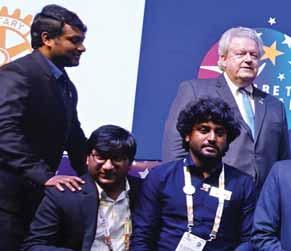
It is easy to give lectures but difficult to change a single life. Triveniben has dedicated her life to rescue girls trapped into prostitution.
should legalise prostitution, I ask what kind of society is it that makes a woman an object of sexual desire in order to serve its needs? All those who feel legalising these illegal acts of brutality against women will give women a safe environment against rape are inhuman in their approach towards women.”
Irani had the audience eating out of her hands
through her sharp rejoinders, witty comments and humorous comebacks. To a question from one Rotarian on gender equity she asked about his profession and shot a counter question on whether he paid equal wages to his male and female workers. When he said “Not exactly, it depends on the scale…” she said, amidst applause, “There you are! One of the challenges women face is how to progress up the (corporate) ladder.”
Employers need to ask themselves if they evaluated fairly the contribution of men and women at the workplace, the number of hours and the standards applied in things like extending deadlines, for both men and women.
She cut short another long-winded question on so many educated and

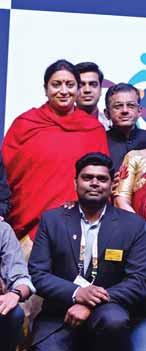
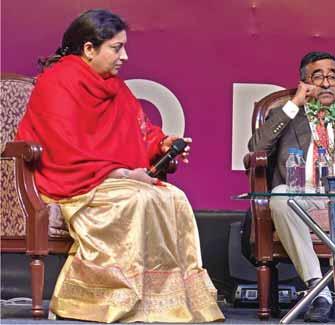

qualified women, such as chartered accountants, not being allowed to work after marriage and the need to “motivate husbands”, with a humorous: “I have to motivate husbands? I don’t know sir,
why do you think I should motivate other women’s husbands… maybe because of the Tulsi role (in the popular Hindi serial Saas bhi kabhi bahu thi).” She added on a serious note: “The challenge we

have is that women CAs often have to relocate after marriage and most of them don’t know how to restart their practices in the new place. If people in the same profession can help them, it would be great.”


Answering questions on literacy and building toilets in schools, she asked: “What help do you need? Tell me and it will be done.”
On equal opportunities, she said these exist in our country but the problem is in enforcement. Giving the example of 26 weeks maternity leave for child care, she said, “We found that one of the biggest media houses in the country, which was debating this issue on prime time, did not enforce it in its own organisation! So the government does make laws (for gender equity) but they have to be enforced.”
Pictures by Rasheeda Bhagat

Rasheeda Bhagat
It was a colourful intro of the next Zone Institute at Kochi by RI Director and Convener Kamal Sanghvi, and PDG Sanjay Khemka who will be the chairman of the Institute to be held from Nov 26–28. Earlier in the day, RI President Mark Maloney inaugurated the Kochi Institute booth which was colourfully and creatively done with a typical Kerala boat crafted and brought from God’s own country. Decorated with spices and coconuts, it enticed Rotarians to quickly register for the next Institute and get an early bird discount.
Inviting Rotarians to attend the Kochi Institute, which will be held at the Grand Hyatt, Bolgatty Island, Convener Sanghvi recounted the many attractions of the southern city, calling it “a quaint city, a city of spices and Chinese nets as well as big bucks, large buildings, delectable sadhya and a mix of world cuisines. But it is also a very modern city.” He added that Kochi was also known as the Venice of the East and promised that Chairman Sanjay Khemka would
ensure them an “Institute of love and friendship… an Institute of the heart… where you renew old friendships and make new ones.”
Khemka added his pinch of spice by alluring participants with promise of “a variety of curries, appams and other delights for a truly gastronomical experience. Add to this the serenity and magic of the backwaters and boat rides, and Kochi is truly a traveller’s paradise.”
While the co-chair of the Kochi Institute is PDG T V R Murthy, Institute Secretary is PDG John Daniel and Master Planner PDG Sandeep Narang. PDG Anirudha Roy Chowdhury is the Vice-Chair.
The promo ended with the entire Institute team, and their spouses dressed in lovely, traditional Kerala sarees, as well as RIPN Shekhar Mehta and Rashi, dancing to the Malayalam hit song jhimki kamal.
Online registrations can be made at www.rotaryinstitute2020.org
Pictures by Rasheeda Bhagat
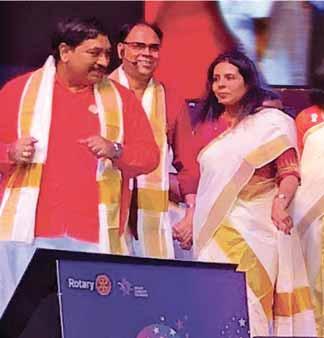











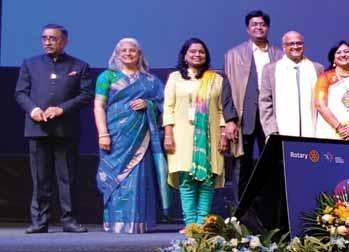
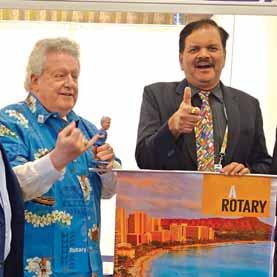
Jun
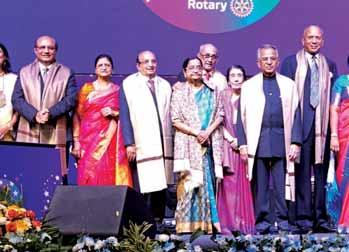

Right: Every Diwali, RID 3080 sends sweets to soldiers serving on our borders. The idea was originally given by Usha Saboo in 2017 and along with husband PRIP Rajendra Saboo and the district’s Rotarians, this project has flourished. Project Chairman Kawal Bedi appealed to the delegates to support this cause. RID Bharat Pandya is also seen.


RI President Mark Maloney inaugurated the website,www. rotary-india.org, to mark the Rotary India Centennial. The website is designed to give an overall scenario of all the districts in the zones, the man hours the Rotarians have volunteered, the community projects executed, global grants availed, contribution to TRF etc.
Below: Heritage Awards were presented to senior leaders of Zones 4,5,6 and 7. “They are our pride and they brought Rotary to where we are today,” said Institute Convener and RID Bharat Pandya.
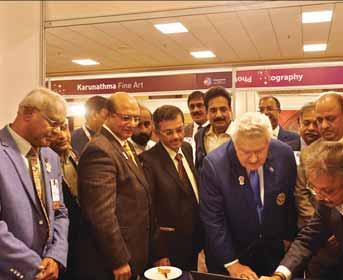

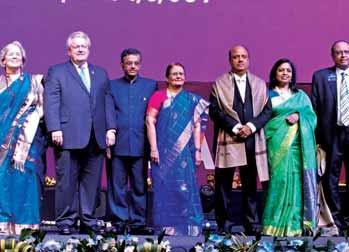

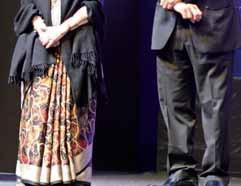





In connection with the ‘Know your numbers’ aspect of Project Positive Health, a tie-up between Rotary and Apollo Hospitals was inaugurated by President Maloney. Health Cards were given to Rotarians to get a complete medical checkup and consultation at the hospital at a subsidised rate. A special booth at the Institute offered free tests for basic parameters such as BP, sugar, etc.

The increasing importance of Rotaractors — from the resounding success of the #Elevate Rotaract vote at the last CoL, invitation of 60 Rotaractors at the International Assembly 2019 in San Diego, to their huge participation in the Hamburg Convention — was reiterated at the Indore Institute. In a first-of-its-kind, 26 Rotaractors were

brought to Indore to participate in the proceedings, with an exclusive session for them, which saw diverse views on the recent Board decisions pertaining to Rotaract.
At a panel discussion, it was disclosed that the RI Board has decided to collect per capita dues from Rotaractors. To a query from Srijitha, PDRR of RID 3291, on the amount,
RI President Mark Maloney said that it will be decided at the upcoming Board meeting. “It will be a reasonable rate. Definitely not as much as what Rotarians pay. It will streamline our administration. At present we really do not know how many Rotaractors we have. When we have dues paying members we will have statistical information that we can plan with and build upon.
District Rotaract leaders with RIPN Shekhar Mehta, Rashi, RID Kamal Sanghvi, RI General Secretary John Hewko, Margarita, TRF Trustee Jennifer Jones, PDGs Shyamashree Sen and Ruchir Jani.




Further, with Rotaract as member of RI, clubs will be expected to do some service and we need funds for that.”
He said this at a panel discussion with TRF Trustee Jennifer Jones, RI General Secretary John Hewko, DRR Kushal Bhuva from RID 3054 and PDRR Srijitha of RID 3291, moderated by RID Kamal Sanghvi. Maloney, RIPN Shekhar Mehta, RID Bharat Pandya, TRF Trustee Gulam Vahanvaty and PRID C Basker were among the audience comprising Rotarians and Rotaractors.
#Elevate Rotaract, lifting the age limit of Rotaractors and doing away with Rotary sponsoring Rotaract clubs were all discussed.
“Why was it necessary to elevate Rotaract?” asked Sanghvi to Jennifer. She replied: “In 2016, we found that only five per cent of Rotaractors transitioned into Rotarians. That shocked
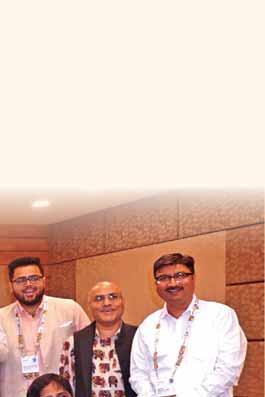

us. We thought that Rotary was part of their DNA and we should keep them as part of the family. The decision on dual membership at the 2016 CoL brought the Rotarians and Rotaractors one step closer. Many Rotaractors did become dual members. Then in 2019, we elevated Rotaract and made it a member of RI — a very important step to tell Rotaractors that you are more than just members, you are part of the Rotary family.”
The vote for Elevate Rotaract at the 2019 Council didn’t pass the first time. “There was a humongous campaign which started within seconds on social media, so much so, there was a repeat vote the next morning, and it was approved with a huge majority. What a celebration that was,” she said.
“The decision has given us more responsibility so that we can execute bigger things now,” commented DRR Bhuva and PDRR Srijitha said, “A number of my fellow Rotaractors have promised to join Rotary now.” She is a dual member since 2017 and will be chartering a Rotary club by the end of this month.
Following recommendations from the Elevate Rotaract Task Force, the RI Board which met in October, has removed the upper age limit of Rotaract while maintaining that Rotaract is a programme for young adults. Commenting on this decision, Hewko said that when the upper age for Rotaract was 30, and 40 was the threshold for joining Rotary, it was a big gap. People who had left Rotaract could engage with Rotary only after 10 years. By then they were lost. “We
found we were losing 95 per cent Rotaractors. Hence, this decision to allow Rotaractors to continue in Rotaract until such time they are ready to join Rotary.”
To the DGEs and DGNs, he said, “Utilise this opportunity to strengthen membership. Treat Rotaractors as equals. That means, giving them positions wherever appropriate — to run sessions in a district conference, projects and to really make a difference. They are just not guards to do the heavy weightlifting. They can provide tremendous ideas, energy for leadership in terms of how we can move Rotary forward in India, and throughout the world.”
“Srijitha, would you still like to open a Rotary club or would you like to stay as a Rotaractor,” asked Sanghvi.
“When I joined Rotaract it was more of fellowship, professional development and leadership. Now we are moving towards a Rotaract that is equally emphasising on service. I think one should listen to his/her inner call. You may be 30 or beyond. But you will know that it is time to move on to the next level. I felt this transition being a dual member. Some of you could feel to continue as a Rotaractor and certainly at some point you will get a call. It opens out boundaries and gives us opportunities to serve,” replied Srijitha.
Surprisingly, the decision lifting the cap on age limit did not go well with a majority of Rotaractors or Rotarians. “It need not be 30, and can go up to 35. But age limit has to be
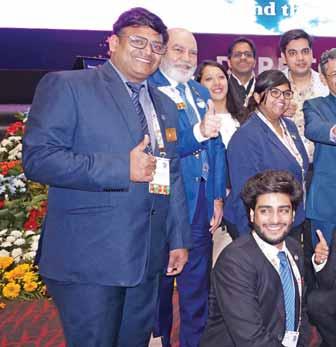
defined. Because Rotaract is such a fun movement that nobody would want to leave. Ultimately I strongly recommend every Rotaractor to join Rotary as and when they become financially comfortable,” commented PDRR Shashwat Desai, son of PDG Ashish Desai and DG Bina of RID 3060.
Rtn Harshvardhan, a past DRR 15 years ago and a second gen Rotarian, said, “The essence of Rotaract is in its youth. By extending the age, you are removing the essence of the youth. Taking it beyond 30 will boomerang for Rotary.”
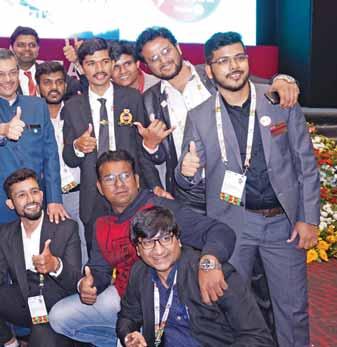
RIPN Mehta, sharing his views on the decisions, said, “The DGs, DGEs and DGNs have agreed to include their DRRs as members in their Membership Committees. The Board has removed the age limit for Rotaractors, but it doesn’t stop any club from having an age limit. If a Rotaract club wants to fix an age limit as 35 or 40, you can still do that. I think we have best of both the worlds.”
Jennifer observed how much Rotarians and Rotaractors can learn from each other and she saw this firsthand at the last IA at a breakout session on public image. “When a DGE said that Rotaractors can help with the social media, a Rotaractor from India quickly responded: yes, we can help you with technology and social media. But we want you to teach us how to tell a story. The moment was so brilliant… this idea of cross-mentorship between Rotarians and Rotaractors.”
Another Board decision highlighted by Rtn Karthik Kittu, a past member of RI’s Rotaract-Interact Committee, was that if five Rotaractors pool in and contribute $50 to TRF, they will get a
certificate directly signed by the TRF Chair. “This is a remarkable decision. Earlier you would get certificates only on contributing $1,000,” he said.
There was a mixed response to the decision allowing Rotaract clubs to be chartered without a sponsoring Rotary club. Srijitha felt that institution-based clubs do not require a sponsor, but community-based clubs need one.
But Bhuva opined that doing away with the sponsor was not a great idea. “We are a group of young people who may want to become president by chartering a new club. Then the club’s sustainability will go down. Further if a Rotary club is sponsoring a Rotaract club, then Rotary will hand-hold them in the initial stage at least,” he added.
Earlier RIPN Mehta, RIDs Pandya, Sanghvi and Hewko addressed the Rotaractors in a brief session. “Rotaract is growing in our country. But you must take your positions seriously and focus on membership,” said Pandya, adding that in many clubs, it is only on paper and the process needs to be streamlined for better benefits.
Pictures by Jaishree



As part of global efforts to rejuvenate the soil, RID 3190 has launched the Koti Nati (planting one crore saplings) Project “to eradicate the polio of our planet,” said D Ravishankar, IPP, RC Bangalore Orchards, at the Indore Institute.
“I cringe every time Rotarians refer to me as `100 crore donor. Instead I would be happy if you call me someone who worked to protect the environment. For life is much beyond money and we follow the philosophy of giving back to society, for after all only society helped us to gain wealth,” he said. His club has recently completed 126 Happy Schools, 145 playschools and 45 anganwadis, benefitting 10,000 students a year. While Koti Nati is being implemented across Karnataka in a phased manner to plant 10
million saplings, “we have also initiated disbursement of 10 crore seed balls over mountainous terrains and reviving of dried up rivers and streams across the State. Former IAS officer K Amaranarayana has been inducted as Project Coordinator of Koti Nati.”However, last year (2018–19), RID 3190 could plant only 38 lakh saplings in Kolar and Chikkaballapur districts for want of skilled manpower, thanks to political turmoil in Karnataka.
Rotary is playing a mediatory role between the Central and State governments. The Central government releases MNREGA funds to the State governments, to be routed through zilla parishads and village panchayats to reach farmers, who are trained by Rotary and other NGOs. he said.All the 39 RI Districts can take up Koti Nati Project by tying up
with local NGOs and respective State governments, said Ravishankar.
RID 3190 is collaborating with the Art of Living Foundation and other NGOs to implement this ambitious green mission which also enables farmers and rural people to get employment through the year. “Each farmer will get a daily wage of `250–300 for planting saplings in their villages.”
Talking about contributions to TRF, he pointed out that there is lack of clear understanding among Rotarians on why we need to give, where our money goes and how it is routed back as DDF and Annual Fund to finance Rotary projects. Rotary can connect the world only if it “first makes a connect with nature. We can create a better world if it is connected for a better cause of protecting the Earth,” he signed off.

V Muthukumaran
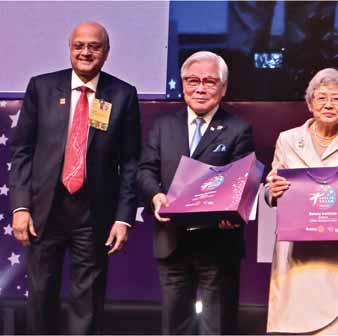

With a comprehensive fundraising goal of $400 million for 2019–20, the Foundation has asked every Rotarian to contribute at least $100 to meet the Annual Fund target of $140 million. “The Annual Fund is crucial to TRF’s ability to continue funding many of our life-changing programmes and projects,” said Seiji Kita, TRF Trustee from Japan at the Indore Institute.
Around 80 per cent of Rotary clubs across the
world give to the Annual Fund and the goal is to increase this percentage, said Kita during his speech on the topic Connect with Rotary Foundation. Ending polio will continue to be the number one priority of Rotary for “we must fulfil our promise to every child for a polio-free world and finish the job.”
Share the polio story
He urged Rotarians to “share the amazing story of polio eradication in our communities to increase public awareness on
Rotary’s role to end this crippling disease. This ensures the success of our current work and to leverage that success to create a legacy for future undertakings.” On the World Polio Day (Oct 24), Rotary’s Online Global Update streamed on Facebook across time zones and different languages.
“The online update was viewed 176,400 times and 5,790 events were registered, of which 187 were from India.”
For polio, the Foundation target is $50 million
this year, and if that goal is reached, the Gates Foundation will match it with $100 million, bringing the total Polio Fund to $150 million.
Kita asked Rotary districts to fully utilise the DDFs either through district grants, global grants or by making contributions to PolioPlus and the Rotary Peace Centres.
“There are many ways to utilise these funds to form transformative partnerships,” he said. Besides the Polio Fund of $150 million and Annual Fund of $140
million, the Foundation has targeted to net $75 million for the Endowment Fund in outright gifts and commitments, while the global grant funds and other outright gifts is poised to touch $35 million, thus reaching the overall fundraising goal of $400 million this year.
Rotary is aiming to build a TRF Endowment of $2.025 billion by 2025 with a minimum of $1 billion in net assets. “Imagine the good we will be able to do with a $2 billion endowment. The investment earnings will provide nearly $100 million a
ComeLast year, the Foundation received $395 million, thus surpassing the fundraising goal of $380 million.
year for Rotarians to do all kinds of life-changing projects,” he said.
Charity Navigator, a top evaluator of charities in the US, has given TRF its highest 4-star rating for the 11th consecutive year.
“This rating recognises our strong financial health and our commitments
to accountability and transparency. Only one per cent out of thousands of charities had received this distinction,” he said.
Rotary India centenary Seiji Kita congratulated Rotary leaders in India as they would be celebrating the 100 th anniversary
of RC Calcutta in Jan 2020. “The event will be a wonderful opportunity to celebrate your amazing history. While membership in North America and other parts of the world is declining, India’s 150,000 membership is still growing which means the country plays a leadership role in all Asian regions,” he pointed out.
Last year, the Foundation received $395 million, thus surpassing the fundraising goal of $380 million. During the year, TRF awarded 1,403 global grants worth $86.6 million and 494 district grants worth $26.3 million.
March 21, 2020, Dr Bina
Vyas will be chairing the International Inner Wheel (IIW) Convention in Jaipur as its President, the seventh Indian woman to reach this coveted post. Currently its Vice-President, Bina said for the first time India will be hosting this global convention. Started in 1924 in Manchester, UK, the Inner Wheel is present in 104 countries with a global membership of over one lakh.
The IIW has close association with the UN and in India, they have adopted 1,570 villages in a flagship programme. “We have 46,000 members across 1,350 clubs in India divided into 27 IW districts. Our vision mantra is orphan-free India which we will achieve in a decade or so,” she said.
In polio and literacy projects, “our women are more active than

Mehta, Vanathy Ravindran, PDG Mayur Vyas and RID Bharat Pandya.
Rotarians. We have been associated with Rotary for over 25 years in its efforts to eradicate polio and are active partners in literacy programmes.”
As IW clubs are doing projects with Rotary hand-in-hand, “my request to Rotary is to recognise IW as your ‘partner in service’ which
will further enhance our image,” said Bina. She is also a Rotarian being the charter president of RC Anand Milk City, RID 3060. With moral support from her husband, PDG Mayur Vyas, she is looking forward to lead the international women’s movement.

Rasheeda Bhagat
A teary-eyed farewell
How much the meticulous planning and successful execution of a Zone Institute means to an RI Director hit the participants at the Indore Institute when in the concluding moments of the five-day spectacular event, RID Bharat Pandya broke down while thanking his chairman and close friend PDG T N Subramanian for helping to put it together.
Pandya ran a tight ship, and was particularly strict with the timing, pulling out the whip or slipping in a courteous comment when required, with the result that the timing was mostly adhered to, something unusual in the last five Institutes I have attended and covered for Rotary News
His eagle eye ensured that all those who had helped him plan and execute the event were thanked adequately and given a memento to take back home. But his extremely efficient and businesslike self melted when it came to thanking Institute Chair, fondly known as Raju Subramanian, in the Rotary world. Neither Pandya nor Subramanian could hold back their tears, and Madhavi too yielded to the emotional moment.
Picking up the buzz at the dinners and the lunch venue on the final day
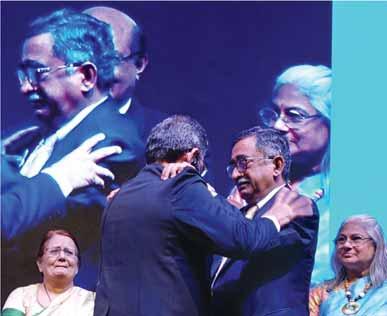

of the Institute, it became apparent that the organisation of the event, choice of city, the various sessions and particularly the food on offer, had gone down well with the participants. “The grace both Bharat and Madhavi showed was incredible; Madhavi actually came and personally gave each of us a little gift; I was really touched,” said an aide.
Felicitating RIPN Shekhar Mehta at the Indore Institute, PRIP Kalyan Banerjee said, “all of us knew that some day our Shekhar would be President of RI, but none of us would have dreamt he would make it at the first attempt. He is always in a hurry, always on the go; when he wants to do something he just goes and does it. And wherever he goes Rashi is always with him, giving him the balance and strength to work till 2 am, sleep for three hours and then take a 6 am flight

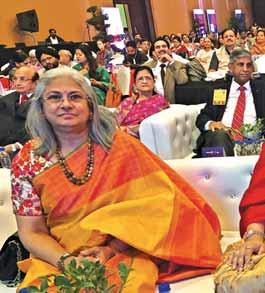
From L: Vidhya Subramanian, Union Minister for Textiles, Women and Child Development Smrithi Irani and RIPN Shekhar Mehta. Also seen: PRID Ashok Mahajan, Nayantara, PRID Y P Das, Manju and Vinita, wife of RIDN A S Venkatesh.
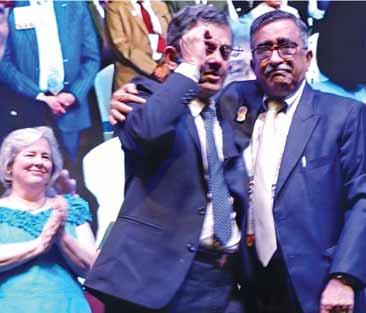

on.

to somewhere the next morning.” There he meets people, addressing meetings throughout the day, “snacks on pizzas and pani puri in between and then goes on to work till 2 am. I used to
be called ‘energy Banerjee’, when I started out 10 years ago, but Shekhar is in a class of his own. And he makes others move too on their own; he is truly an amazing motivator. Where
he gets his zest for life I don’t know but we do know that when he was announced as the new RIPN, all Rotarians felt they had all become presidents themselves.”
Banerjee added: “They say morning shows the day, but as he prepares himself to get into the groove for the RI President’s role, we need to tighten our seat belts and get ready for one heck of a trip. It’s not going to be an up and down one, but up, up and away.”
In his inimitable style RI President Mark Maloney began his inaugural address at the Institute on a lighter note. Addressing RIPN Shekhar Mehta and Rashi, he said that at Evanston, the RI maintains two condos, one for the President and one for the President-elect… you move into one and stay there for two years. There isn’t a presidential condo and president-elect condo. “So Shekhar and Rashi will move into Gay and my condo on the 14 th floor; Holger (Knaack) and Susanne stay on the one on the 13th floor. So come July, Shekhar and Rashi will move into our condo and Gay and I have promised that we will not trash the condo in which they will move.”
President Maloney disclosed that this was Day 21 “on our 30 day trip. This is our longest trip so far in our
presidential travels and may be the longest we will have. As you can tell I haven’t seen my barber in a while. I was looking at the pictures in the intro video and thought he is pretty handsome and then I saw the photo of me live and thought: ‘Wait, who is that shady guy? Anyway, that is one of the challenges of being RI President.”
In this trip, he added, they were circumnavigating the globe. “Gay and I left separately; Gay from Alabama, and I from Evanston. We were to meet in Los Angeles and then travel to Kobe in Japan but Gay had flight problems and I didn’t see her again till we met in Kobe at the Japan Institute.”
Next, they went back across the Pacific to the Panama Institute “and again crossed the Pacific for the third time for the Korea Institute, visited Vietnam, and came to Indore and before going home we will visit three districts in Turkey. It appears that Gay and I are making an attempt to fly on every commercial airline that exists in the world.”
At the Indore Institute, Union Minister Smriti Irani was one of the most popular speakers and had the audience eating out of her hands with her sharp replies and witty rejoinders. Irani disclosed that she had been a Rotaractor too, amidst a roar of approval from the DRRs in the audience. When asked
for “one advice to youth”, she said for one, she was already 43 and not sure if she was young enough to do that (“though age is a matter of the mind, as I’m sure the many grey-haired men in the audience agree”), and anyway there is “too much advice going around from politicians. But I can make one request. We are poised to lead in the next industrial revolution. But do we want to be just consumers of technology or its owners? How many tech companies in India are owned by women?”
Also, more women needed to get into science and mathematics. “With regards to youth in rural India, let’s inculcate in them a sense of innovation; there are many who are already innovating but don’t know how to turn that into an enterprise. If you can help them commercialise their ideas, it will be a step forward. This is just a request, not advice!”
Inviting Rotarians in India to join the Convention in Honolulu, President Maloney said this would be the second


RI Convention in Honolulu, the first being held in 1969, and will have a revamped schedule with more flexibility to enjoy Hawaii. “We aren’t foolish. We know people would rather be on the beach rather than inside the Convention centre. So there will be fewer plenary sessions and breakout sessions will end earlier in the day so that you can enjoy all that Honolulu and Hawaii have to offer.”
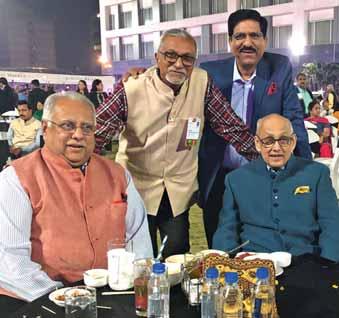

At the TRF Dinner during the Institute, where PDG J B Kamdar and Marlene were inducted as AKS members at a higher level (Chairman’s level with a donation of $500,000), Kamdar said Marlene and he were blessed in many ways. Though born into “families of modest means, we grew up in an atmosphere where there was always a richness of heart and a philosophy of sharing whatever we have, thanks to the influence of our elders. We learnt to save and to share what we saved with others.”
They had even saved some money on this induction, he added. TRF Trustee Gulam Vahanvaty “gave us the option to get inducted at Evanston or here. Flying business class to Evanston for two of us would have cost some ` 10 lakh. We saved that money… probably Gulam will collect it for the Annual Programmes Fund.”
Another unique way they saved, added Kamdar, who is fond of “expensive cruises and watches, while Marlene is fond of jewellery”, was by deciding that “I will give my money to TRF and she will use hers to buy me expensive watches.”
Pictures by Rasheeda Bhagat

Rasheeda Bhagat
Rotary Founder Paul Harris and wife Jean’s home in Chicago is called Comely Bank. “Here they had lived till Paul died in 1945, and where Rotary was born and many of its early Board meetings took place. Having been built in the early 20th century, it was getting dilapidated, and was going to be demolished by the local corporation. That’s when, some 15 years ago, a few dedicated Rotarians decided to repair and refurbish it and have it last as a memorial of our founder and as a Rotary heritage site,” disclosed PRIP Kalyan Banerjee at the Indore Institute.
A special Trust called The Paul Harris Home Foundation
was created to save and refurbish that house and it is now headed by PDG Robert Kneupfer, who had served the district and was a member of Rotary One, RC Chicago.
The Trust was today looking at Rotarians and Rotary clubs across the world “to chip in and help raise over $10 million required to repair and refurbish Comely Bank, with enough left to pay the city taxes and maintenance expenses in the future.” Contributions have started to come in, with Japan promising to put in over $1 million.” The RI Board supports this decision and President Mark Maloney had taken the Board members to visit the Harris home in Chicago. But
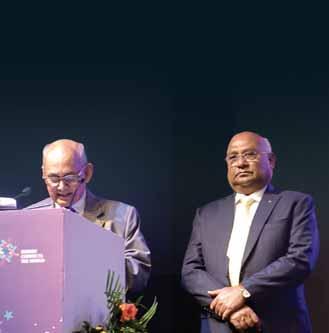



RI can’t spend any money on its renovation as the members’ dues were required for administration.
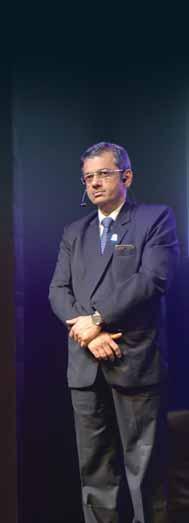
“So, we need to give separately; it does not matter how much you give, but whatever you do, will help. There are naming opportunities for different rooms and areas of the building and donations are welcome from individuals, clubs and districts,” Banerjee added. Donations can also be made directly to the P H Home Foundation (at www.paulharrishome. org ) or given to Paul Harris Home Donor Advised Fund at TRF. Appealing for their generous contributions Banerjee said, “if we want to help preserve a monument that will forever preserve the memories of our founder Paul, and stand forever as a Rotary relic for future generations of Rotarians, please step forward and do whatever you can.”
For further details, Rotarians could contact PRID C Basker, past president from RC Bangalore Orchards D Ravishankar or Banerjee himself, he added.
Rasheeda Bhagat
Expressing his admiration and amazement at the quality and scale of projects done by RI District 3211, as he inaugurated/unveiled a few of them to mark Rotary India’s centennial year, RIPN Shekhar Mehta said, “This is not to undermine the work done by Rotary in other parts, but I have always been a huge admirer of Rotary in southern India. I find Rotary really thriving in the south; look at the huge membership growth that the South has shown.”
Referring to a single club — Rotary Club of Pala — alone doing a project worth `11.5 crore in giving medicines to government hospitals, he said: “This is astounding. Add to this the 1,000 houses you are going to
build (300 will be completed this year) for the flood victims in Kerala, the mobile mammography bus donated by the Y Daniel Foundation (run by PDG John Daniel) at a cost of `1.75 crore, plus the additional houses this Foundation is building, and so many other projects in healthcare, literacy, etc, and you are doing great service.”
He called on stage and honoured the incoming president of RC Pala, Srinivasa Vachaparampil, who was the moving spirit behind the ` 11.5 crore project for medicines.
Reiterating that Rotary in India was the “Kohinoor in the RI crown”, as nowhere else in the world were such mega service projects being done, or such membership growth reported, Mehta urged Rotarians to scale up both

their service projects as well as membership goals. Any district with 4,000 members should be taken to the 5,000 figure, and then split to accelerate growth. He gave the example of Bangladesh which had only 3,000 members, but “they split and in five years have grown to 10,000. The same is true of RID 3230 after it split. Partitioning is heartbreaking but good for growth.”
Mehta presented the Service Above Self Award to DGE Thomas Vavanikunnel, honoured PDG Ramaswamy Iyer for completing 50 years in Rotary, and commended the homes for flood victims built by the district last year under the leadership of PDG E K Luke and PDG John Daniel for the service projects he was doing for Rotary through his Y Daniel
RIPN Shekhar Mehta and Rashi with (from L) DGs S Sheik Saleem (D 3212), Shirish Kesavan (D 3211) and PDG John Daniel.




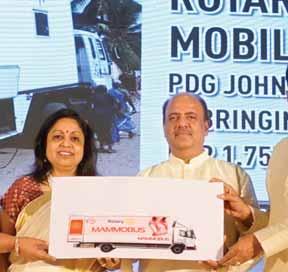

Foundation. PDG Daniel handed over the Rotary Mammobus financed by his Foundation at a cost of ` 1.75 crore to Mehta, along with a cheque of ` 25 lakh for some more homes for the flood victims.
On behalf of RID 3211, DG Shirish Kesavan handed over a cheque of ` 6 lakh to Mehta for 100 shelter kits.
Other projects planned/executed by the district include an ambulance for trauma care, a school bus, dialysis service for the needy, a blood bank, free medicines for the flood affected in Wayanad district, a home for the mentally-challenged, and a global grant for providing 200 sewing machines.
Responding to DGs Shirish Kesavan and Sheik Saleem (RID 3212) and several PDGs who had felicitated him, Mehta said he and Rashi were “overwhelmed” by the spontaneous love and affection that Rotarians had displayed at various felicitation events. He understood the joy every Rotarian
RIPN Shekhar Mehta once again reiterated his conviction that Rotary, which is on the verge of eradicating polio, should get the Nobel Prize. “We deserve it for the work we have done. After all, in 2,000 years only one vaccine-preventable disease has been eradicated from the world, and polio will be the second one. When that happens, it will give us huge publicity; we will not have to go to anyone to talk about us!”
Referring to the oft-talked about Kolkata connection to all the four Indians who had marched towards the RI President’s post, Mehta brought in the City of Joy’s connection to “the maximum number of Indians who have won a Nobel Prize. Once again, a Kolkata man, Abhijit
Banerjee, has got a Nobel. He is from my school and was two years my junior. Indians from Kolkata who have got a Nobel include Rabindranath Tagore, Mother Teresa and Amartya Sen, apart from Banerjee. Who knows when an Indian from Kolkata might receive it again? No special credit to me, but somebody will have to go and receive it on behalf of 1.2 in the world!” he said, amidst applause.
But, Mehta added, he was tired of the 1.2 million number on Rotary’s membership, which had remained constant. “Let’s make it 1.3 million… in three years if each one of you can bring one member… we can make it 1.3 million by taking India’s membership to 2.5 lakh on the day I lay down office in 2022.”

felt in seeing a fourth Indian reaching the topmost position in Rotary. “That is why when Rotarians want to take pictures with us, I willingly agree, because 30 years ago, if an RI President had come to my club or district, I would have wanted to do the same!”
Complimenting PDG Daniel, Chairman of the centennial celebrations/felicitation event, the RIPN said “getting 1,200 people to come to a felicitation ceremony is like having five felicitation events together!” Congratulating RID 3211 DG Shirish


Kesavan for the service projects of the district, especially building homes for the flood victims, he added, “I know how difficult it is to build one house; building those homes is not an easy job. There is no greater charitable work than helping people in a disaster. The misery and distress they experience we can’t even imagine and they will always remember the people who reach out to them during such a time.”
On his nomination, Mehta said this was not something he had planned. When PRID Sushil Gupta withdrew from the position in May due to his unfortunate ill health, he decided in June to put in his name, “and in two months, it all happened. People take years sometimes. My father is very ill, and in an ICU-like situation; I thought I’ll put in my name and will be in the queue for some years…I didn’t know they will push me to the front of the queue.”
Mehta urged the assembled Rotarians to work for one more goal — making Rotary the No 1 service organisation in the world. This would
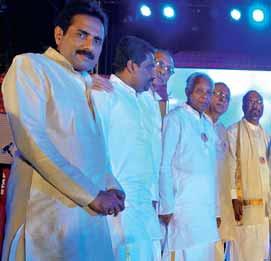


The RIPN also underlined the need for replicating the Literacy project structure in preventive health, water and sanitation and disaster management. Coordinators could be created for each vertical. “If we can put a structured network in place for all these three areas of focus, we will have as many as 500 PDGs involved in our work and this will change the very
nature, manner and the way charitable work is done in India.”
That would also result in “fewer past governors engaged in politics or elections as an idle mind is a devil’s workshop. There are past governors who want to get involved and do service work but they are not getting an opportunity. They don’t want to play only in Ranji trophy matches but also at the national level.”
He requested PDGs or any other Rotarians who want to work either in health, water or disaster management, “to please write to me. We will definitely find a role for you. Let us together change the way Rotary works in India. We already do outstanding work and are now on a springboard; let us take a leap from here.”
happen only if data was collated on the worth and value of Rotary service projects being done around the world, particularly India, where “amazing work” was being done.
On Dec 29, for instance, “in Kolkata we are launching a `25 crore project to make a residential school for 1,000 children; the groundbreaking ceremony will be held that day.” Then, during the Centennial summit, from
Feb 14–16, another `50 crore project will be launched to set up a 400-bed hospital.
The current DGs had pledged to do projects worth an astounding ` 2,400 crore this centennial year. “Where else in the Rotary world do you find this scale of service projects being done? ” Mehta asked and said at the Indore Institute a website will be launched which will enable every club
president to update the value of his/her club’s projects. “Hence very soon we will collect and collate the data and we will be the only country in the world to do so. The RI presidents have no clue how many hospitals or schools we have built or are running. How many benches, libraries we have created… we’re going to change that.”
Pictures by Rasheeda Bhagat
When you have to cover the proceedings of a Rotary Zone Institute for the magazine, in however spectacular city the conference may be held, you can say goodbye to really seeing or “experiencing” the city, in all senses of the word. Unless you are a latenight swinger, which I am not!
So when the Zone Institute of RI Director Bharat Pandya was announced at Indore, the first thing one thought about was the mouthwatering street food that Indore has on offer. Its Sarafa Bazaar is legend when it comes to street food. The first, and only, free evening had to be grabbed. Landing at the Indore


airport in the evening, with my colleague Muthu, who can hardly be described a foodie, given that he can live happy for an entire year on thayir sadam (curd rice), with a modest vegetable thrown on the side, after a quick check in, I marshalled my colleague Jaishree and PDG Shyamashree Sen — both confirmed street food lovers — and headed for Sarafa Bazaar. Muthu tagged along… more as a photographer, and an observer of our hogging, than a consumer!
Indore’s street food, we had been warned, comes alive only after 9 pm and we hit the Sarafa Bazaar, a jewellery market by day, just after 9 pm, to explore what it had on offer. The first thing that hits you on this street are huge, inviting round platters loaded with the most tempting sweet

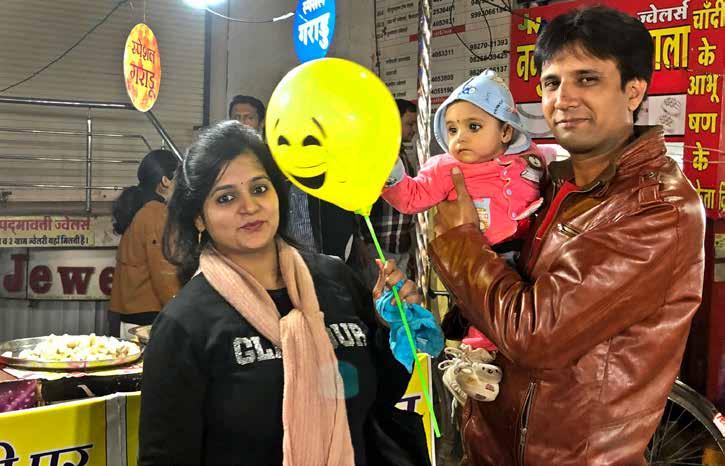


delicacies, ranging from gulab jamun to rabri/firni to jalebi (incidentally it was in Indore, I learnt the difference between the jalebi and imarti, of all the places, at the breakfast table, and out of all the people, from PDG Raju Subramanian!). Then there are the halwas of course… from gajar halwa to moong ka halwa, as well as the piping hot malpuas! Trust me, one stomach is not enough to enjoy Sarafa!
We first went in for the most recommended item in Sarafa — garadu which is made from yam, is fried and spiced up with a chatpata masala powder. It was okay; it didn’t really tantalise my tastebuds. What did were the aalu spirals, thinly sliced
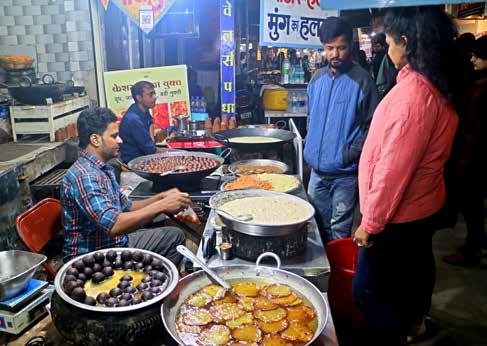
potato done up in a spiral, topped up with cheese and chaat powder and fried to a delicious, soft golden brown. It was a perfect mix of crunchy and soft, and spicy.
Helpfully, at the very next stall was an offering of “coconut crush”, which a little disappointingly, was only tender coconut served with coconut water, making one yearn for the yelaneer payasam (tender coconut payasam), a South Indian delicacy. With this not being sinful enough, our next stop was at the jalebiwala who offered to fry for us a fresh batch. The offer was taken and the delicious fare lapped up hot on a lovely, cool early winter evening.
As Muthu politely turned down almost everything, only gratefully lapping up the more familiar tender coconut water, and was happy clicking away, the
three of us continued our pursuit of more delicacies, stopping to try some “corn kiss”, which was passable, till we laid our eyes on the pani puri guy. The different types of water on offer were not as varied as the ones you find in Ahmedabad, but the pani puri was delicious and we gorged on it, till we couldn’t have any more. And after all this eating, we had spent hardly `500, not counting the `250 or so spent for the “coconut crush”.
Totally stuffed, we could only leave envious
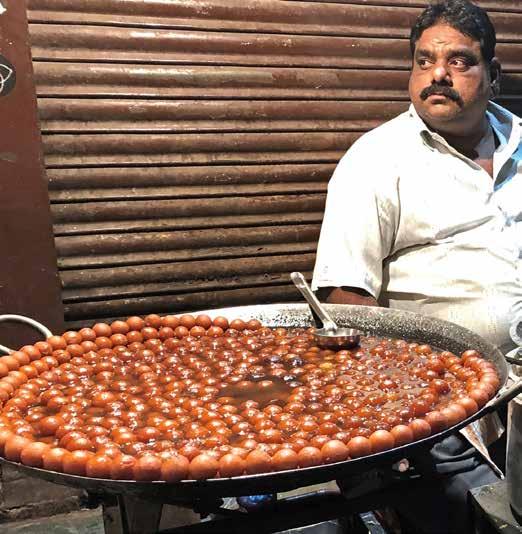



Mouth-watering gulab jamun.
in a variety of flavours.

glances at the vendors offering all kinds of paav bhaji, momos, chaats and a host of other delicacies, till we came to the Delhi Kulfi stall. By now it was midnight, and we unanimously concluded — all four of us — what’s a winter night without a delectable kulfi? It was two mango and two sitafal kulfis, and it melted in the mouth. Fulfilled, happy and almost singing, we marched on, meeting DG Kiranlal Shrestha from Nepal, enjoying jhaal muri Soon the stalls selling a wide variety of paans caught our eye. The famous “smoke paan”… the type that lights a fire in your mouth and only the very brave go for it… was of course there, but it was accompanied by equally exotic stuff such as cherry paan, strawberry
paan, chocolate, mango, butterscotch, leetchi paan you name the fruit and it was there.
No, we didn’t try the paans; after all there should be a reason to return to Indore’s Sarafa.
If you notice, almost all the shops had the facility to pay through scanning the Paytm QR code, which makes payment so easy. Some of the vendors such as Susheela who served us the corn kiss, has been here for 15 years. Most of them pay between `8,000 to `10,000 to the shop owners for the space. But business is good, and when you ask


for their daily earnings, you get big smiles and no numbers!
While the food was awesome, what was even more awesome was that a street like Sarafa, which must be getting thousands of footfalls every evening, manages to remain reasonably clean. When you have finger food, your fingers need to be wiped, or washed. But most of the shops do not offer paper napkins… Mahesh, the young jalebiwala had this explanation: “Ma’am, giving paper napkins is not a problem; the problem is that most of the people who come here are tourists, and they simply wipe

their hands and throw the napkins on the road, but we will be fined by the municipality.”
It’s with good reason that Indore has been smashing the charts as India’s cleanest city for a few years now!
We were told that at 2 am when the market winds up, the Municipal Corporation cleaners are there within 15 minutes and next morning the shopkeepers come to a spanking clean bazaar.
Pictures by Rasheeda Bhagat and V Muthukumaran

Ni hao, Rotarians!
omething amazing happened in Vienna in October. A runner from Kenya named Eliud Kipchoge was the first person in history to run a marathon distance — 26.2 miles — in less than two hours.
For many years, experts thought this would be impossible. They said the human body was not capable of achieving this feat. But Kipchoge succeeded because he had an incredible team working with him. He had pacers who ran with him every step of the way, and people who made sure that he had the proper fuel and hydration. Every few miles, fresh runners were sent in to keep up the pace and help him reach his goal.
Like Eliud Kipchoge, Rotary has a great support team as we approach the final mile in our marathon journey to rid the world of polio. So many amazing Rotarians have helped pace this effort along the way, donating their time and energies to bring us close to our goal.
The World Health Organisation has certified type 3 of the wild poliovirus as eradicated. This is big news! We have also gone three years without any wild poliovirus on the continent of Africa. It may soon be certified polio-free.
The final mile of our journey is a difficult one. Pakistan and Afghanistan are great challenges for us — but we have met so many great challenges before. Every time a goal has seemed out of reach, Rotarians have stood together and answered the call.
This is no time to lose our focus or think the race is already over. Can you imagine what would have happened to Eliud Kipchoge if all of the pacers had gone home for the final 2 miles? He might never have reached his goal.
It takes a special character to pursue a difficult task all the way to the end. These are the times that we need each other most. In the Tao Te Ching, Laozi wrote that the journey of 1,000 miles begins with one step. But it also ends with one step. And those final steps take just as much courage as the first.
Let’s make history, Rotary — the finish line is within reach!

When it comes to souvenirs of your visit to Honolulu for the Rotary International Convention, June 6–10, Hawaii’s artisans and craftspeople have you covered.
The Ala Moana Center (above), two blocks from the Hawaii Convention Centre, is an openair shopping mall with a distinctly Hawaiian flair. Daily hula shows at 1 pm feature both traditional and modern forms of the dance. And alongside chain retailers such as Coach and Gucci, you’ll find beautiful locally made items such as coral jewellery at Maui Divers Jewelry and handmade textiles at ‘Auana Quilts.
If you’re in the mood for a funkier shopping experience, complete with haggling, set aside time for the Aloha Stadium Swap Meet & Marketplace, where more than 400 local merchants showcase their wares, including handmade items and works of art. The swap meet and marketplace are open Wednesday, Saturday, and Sunday. Don’t skip the local snacks on offer: You’ll find that shave ice is the perfect way to cool off in the tropical sun while you browse for bargains.

Don’t miss the 2020 Rotary Convention in Honolulu. Register at riconvention.org by Mar 31 to save.
Gary C K Huang Foundation Trustee Chair
©The Rotarian


From L: Inner Wheel (323) Chairman Nallini Olivannan, PDG Ramesh Aggarwal, Global WinS Chair PRID P T Prabhakar, PDG Natarajan Nagoji, DG G Chandramohan and District WinS Chair P Jayanathan along with Rotary WinS Ambassador Hanifa Zaara.
RIPE Holger Knaack and RIPN Shekhar Mehta have set a target of 100,000 WinS projects across India by 2025. So far, the programme, aimed to usher in drinking water, sanitation and hygiene facilities, has covered 40,000 schools after it was launched in 2017 to mark the TRF centenary, said WinS Global Chair PRID P T Prabhakar, speaking at the WinS Target Challenge seminar in Chennai for RID 3232 clubs.
“We are reaching out to at least 10,000 schools each year and this new target could be achieved easily. Around 44 per cent of morbidity in children occurs due to non-prevalence of handwashing practice in Indian schools. Globally, 4.8 crore children suffer from stunted growth, of which 33 per cent are in India. And of the
40 crore people defecating in the open worldwide, one-third (13 crore) are in India,” he said.
UNICEF and World Vision, a specialist NGO, have partnered with Rotary clubs to install hardware components (such as toilets, handwash stations) and bring in attitudinal change among teachers, students and stakeholders (software component).
The highlight of the seminar was the recognition of Hanifa Zaara, a Class 3 student, as WinS brand ambassador. Zaara was in the limelight last year when she lodged a complaint against her father at the local police station for not acceding to her repeated pleas to construct a toilet in her house.
The incident went viral on social media, and within a day, the Ambur Municipality built a toilet in her house.
And, thanks to her, over 100 families got toilets built by the local body in their houses. Following widespread coverage, Zaara was selected as Clean India Ambassador for Vellore district.
WinS Committee Member PDG Ramesh Aggarwal said that when the Target Challenge, a TRF pilot, ends in June 2020, it will be rolled out on a global scale even as RIPN Shekhar Mehta is planning to push WinS to the next level on par with Basic Education and Literacy.
The WinS India Recognition Committee is giving star-rating to schools which have been adopted by clubs under WASH projects. So far around 40,000 schools have got ratings, he said. With his coaxing, Rotary clubs in the district have agreed to cover 600 schools for one-star rating in this
Rotary year. With support from the UNICEF and other stakeholders, “we are able to integrate WASH lessons into the school curriculum to sustain change in hygiene and sanitary habits of children,” Aggarwal said.
After completing a WinS project, a club has to maintain the sanitation facilities for two years before handing them over to a School Management Committee (SMC) for regular upkeep of these facilities.
The very first project done by Rotary was toilet installation in Chicago in 1907 and the latest project done by RID 3232 was setting up three toilet blocks in Thanjavur (southern Tamil Nadu), said DG G Chandramohan. In a government school near Coimbatore, toilets were maintained clean till the inspection by government officials. After that they converted the newly-set up sanitation facilities into a kitchen and students resumed open defecation. “This only shows how difficult it is to change the mindset of children and teachers,” he said.
He allocated `15 lakh to 21 clubs to set up two toilets and a handwash

station in each school. Prabhakar urged the clubs to pool in an equal amount to reach out to more schools
Dr Meenakshi Bharat, RID 3190, who had mentored Inner Wheel clubs in holding sessions on MHM in schools, cautioned against single use, disposable pads, which harm the environment.” Reusable cloth pads are a better alternative as they cost less, are easy to wash and can be dried in natural sunlight. She called upon Rotarians to introduce cloth pads and menstrual cups to women in their families to spread the message of handling periods in a safe and eco-friendly manner.
RID 323 Inner Wheel Chairman Nallini Olivannan said that Inner Wheel is ready to partner with Rotary clubs to take MHM to the next level.
“We are awaiting government approval to set up feeding rooms for lactating mothers at bus terminals across the State. The first such cabin was set up in Tirunelveli in 2010,” said District WinS Chair P Jayanathan. District WinS Coordinator PDG Natarajan Nagoji and World Vision India specialist Regina Ernst were the other speakers.
PDG A S Venkatesh, RID 3232, has been chosen to serve as RI Director for Zones 5 and 6 for 2021–23. He will be elected at the 2020 RI Convention in Honolulu, Hawaii.
Venkatesh, popularly known as Venky, is member of RC Chennai Mambalam and has served as district governor during 2007–08. He was appointed by RI as Lead Facilitator to train incoming district leaders at the 2017 International Assembly, the first Indian to have served the role.

RI District 3181 was recently honoured with ‘Leadership Builder’ Award for providing homes for victims of the 2018 floods through its ‘Rebuild Kodagu’ programme.
Project Chairman and PDG Dr K Ravi Appaji received the award in Mumbai from Rajashree Birla, Chairperson, Advisory Board of the Habitat for Humanity India.


Under its Amudha Surabhi Project, the club donated 500 kg of rice to Thai Madi Trust run by a transgender. Over 100 people benefit from the programme every month.
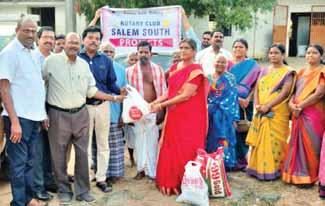
A set of Sensory Integration Therapy tools to treat autism in children was donated to the paediatrics section of the Government Rajaji Hospital. DG Dr A Zameer Pasha handed over the tools to the hospital authorities.

The club joined hands with Mishrimal Mahaveer Chand Trust to distribute tablets to prevent dengue to 1,000 beneficiaries at the bus stand. Anti-dengue campaign is one of the regular activities of the club.

Sweaters and books were donated to students of a government high school. A painting contest was organised for the students.

DG Rajendra Bhamre inaugurated a bus shelter constructed by the club on Nagpur Road. The facility will provide shelter to commuters during all seasons.

A medical camp was held on World Diabetes Day in which 75 patients were screened for various ailments including blood sugar, BP and BMI as per the NCD guidelines given by RI Director Bharat Pandya.
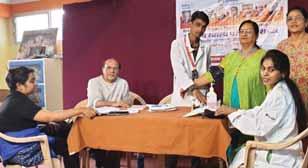

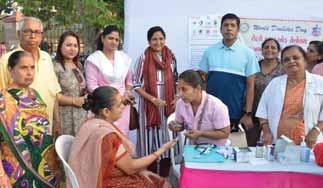
A check-up camp was held to mark World Diabetes Day in which around 100 people were tested for blood sugar levels. The camp was held in partnership with Jamnagar Mahanagar Palika at the Lakota lake ground.
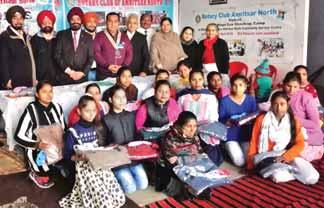
Sweaters and socks were distributed to students of Bimla Nanda Rotary Community Centre at Mohkampura locality in the city. The beneficiaries thanked the club for this gesture as the garments will keep them warm in the winter months.
Rotarians distributed warm clothes, shawls, sweaters and blankets to pavement dwellers to keep them warm during winter. The activity enhanced the public image of Rotary.
Bicycles were given to 25 students in the tribal villages of Sindhalachi Wadi and surrounding areas in the Pen taluk.
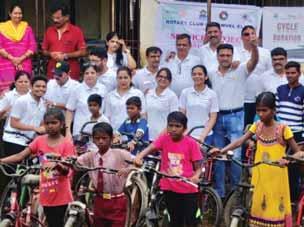
PDG Prafull Sharma inaugurated three renovated classrooms at Dyaneshwar School. The project costing ` 2.75 lakh will benefit over 200 students.

DG P Shivannarayana Rao participated in an anti-plastic drive organised by the club. Cloth bags were distributed to the people and the club members educated the public about the harm caused by plastics to the environment.

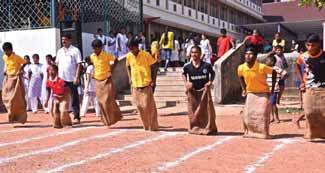
Rotary Orphanage Olympics was conducted for over 600 children from 10 different homes in and around the district at the Canara High School. It was a day of fun-filled games and cultural events for the orphans. Legislator Vedavyasa Kamath inaugurated the event.
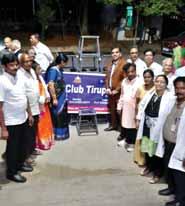
The club donated around 100 stainless steel stools to the SVRR Government Hospital to enable family members of patients to sit comfortably. DG Sameer Hariani participated in the programme.

A renovated toilet block costing `2 lakh was inaugurated by PDG Dr Chinnadurai Abdullah at the Government High School at Vaniangulam village in the district as part of WinS project. A handwash station and 5,000-litre drinking water tank with connecting lines were also set up.

A Happy School Project was completed at the Government Girls Higher Secondary School with upgrades to infrastructure and basic amenities at a cost of around `25 lakh. The new facilities benefitting 4,000 students were inaugurated by DG G Chandramohan in the presence of government officials.

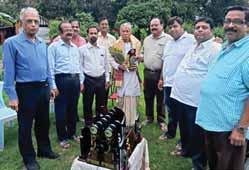
In a week-long camp, over 150 artificial legs and calipers were given to needy people. The club also fed around 750 people including attendants of the beneficiaries free of cost. The project was held with support from the Mahavir Seva Sadan, Kolkata.

An eye camp was held at the local hospital in which around 140 patients were screened and treated for various illnesses due to blood sugar levels. Thirty-five patients were given free glasses and medicines were distributed to the needy at the camp.

The club’s Awards Committee has been giving scholarships to needy, meritorious students and organisation in need of funds for their service activities. With a corpus of `50 lakh, the committee also gives financial assistance to underprivileged patients.
Compiled by V Muthukumaran
Designed by L Gunasekaran
You can pay the Rotary News / Rotary Samachar subscription online
Our Bank details:
Bank : HDFC Bank SB Account
Branch : Montieth Road Egmore, Chennai
A/c Name : Rotary News Trust
A/c No. : 50100213133460
IFSC Code : HDFC0003820
E mail us following details:
Name of Club
President/Secretary’s name
Amount/Date of transfer/UTR Number
For physical payment by cheque or cash in bank, write Club Name only without prefixing “Rotary club of”. Eg. Rotary Club of Delhi Central should be written: Delhi Central.
Rotarians : 1,216,372
Clubs : 35,825
Districts : 525
Rotaractors : 167,530
Clubs : 10,108
Interactors : 245,755
Clubs : 10,685
RCC : 10,815
As on Dec 12, 2019
*Please note Interact clubs that have not reported Interact Adviser in the past two Rotary years, are placed in “Suspended” status effective Oct 1, 2019.













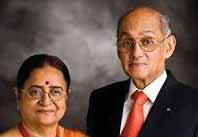














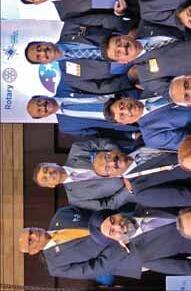
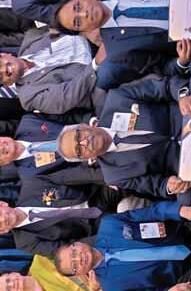


RI President Mark Maloney and Gay, RI Directors Bharat Pandya and Madhavi, Kamal Sanghvi and Sonal, and TRF Trustee Gulam Vahan vaty, with the incoming governors and their trainers at the Zone Institute in Indore.
Regn. No. TN/CCN/360/2018-2020
Licensed to post WPP No.TN/PMG(CCR)/WPP-431/2018-2020
Total number of pages in this monthly issue, including cover, 84. Price: `35
Registered with Registrar of News Papers for India 3880/57 Rotary News Published on 1st of every month
